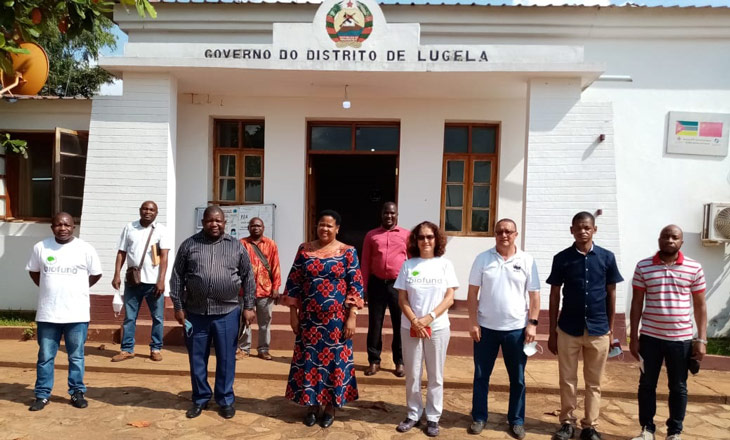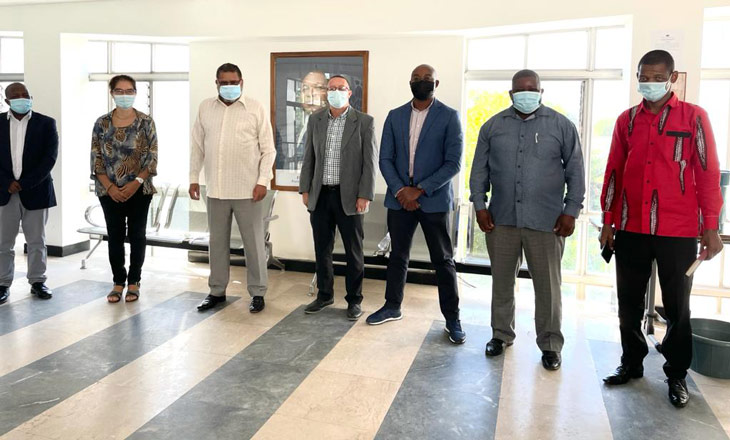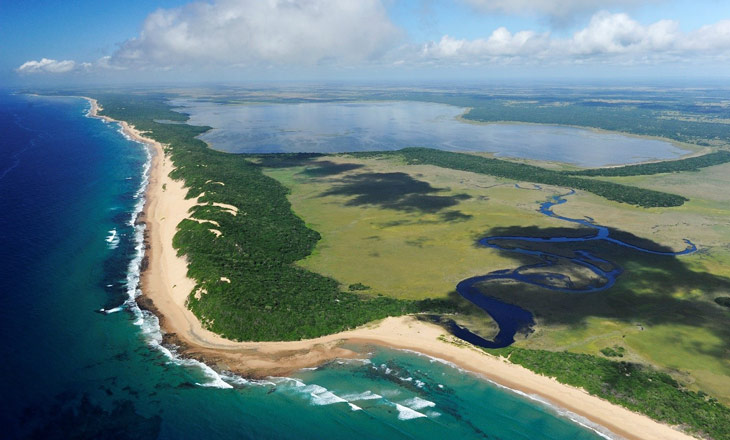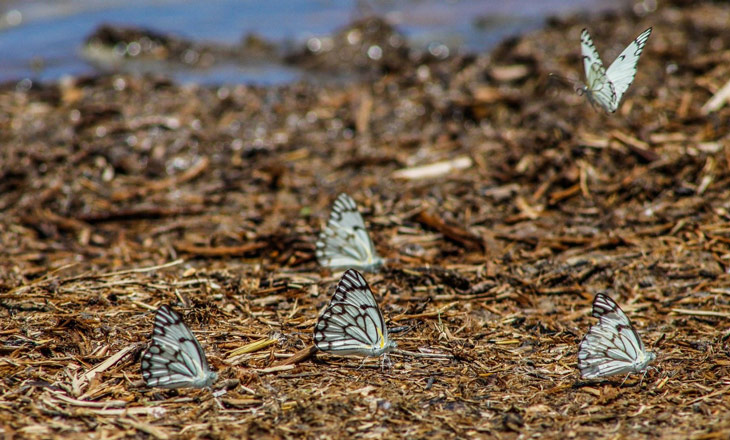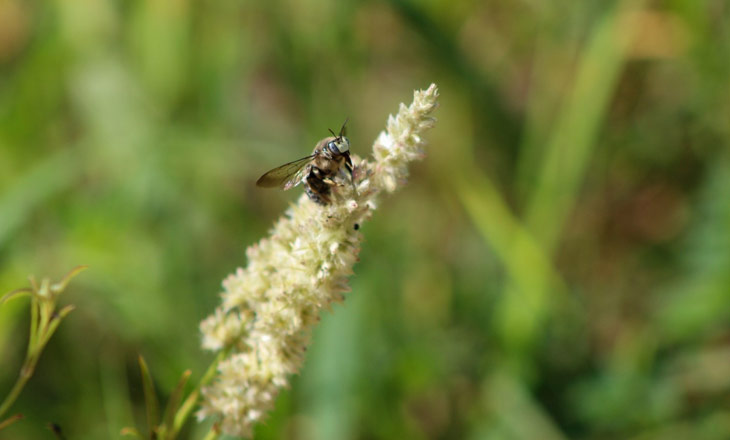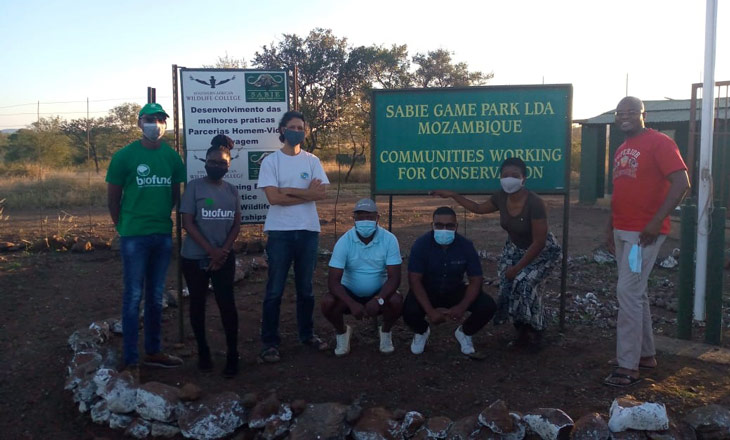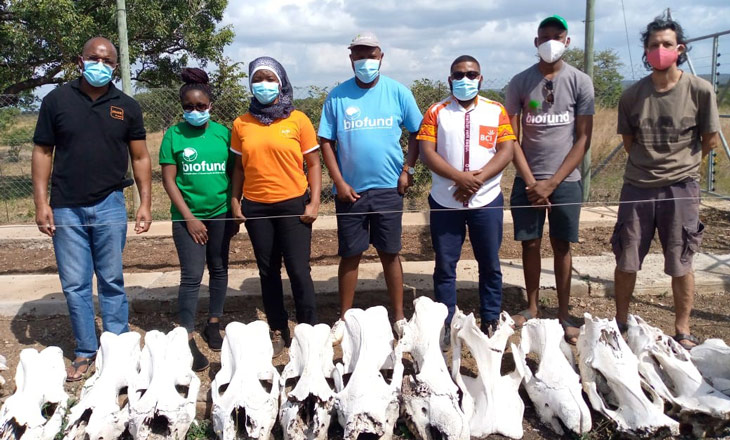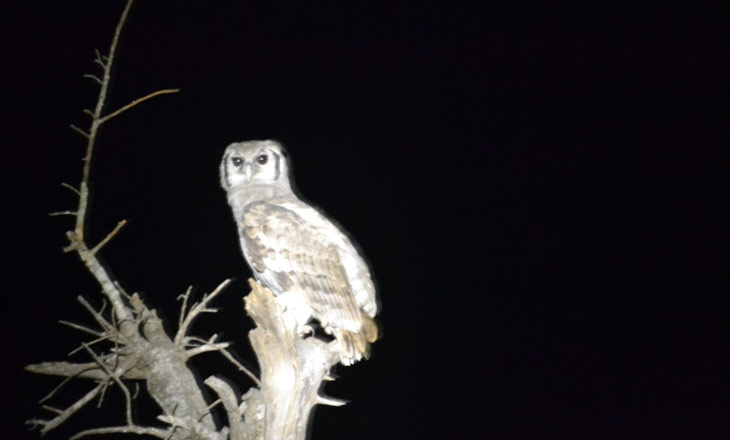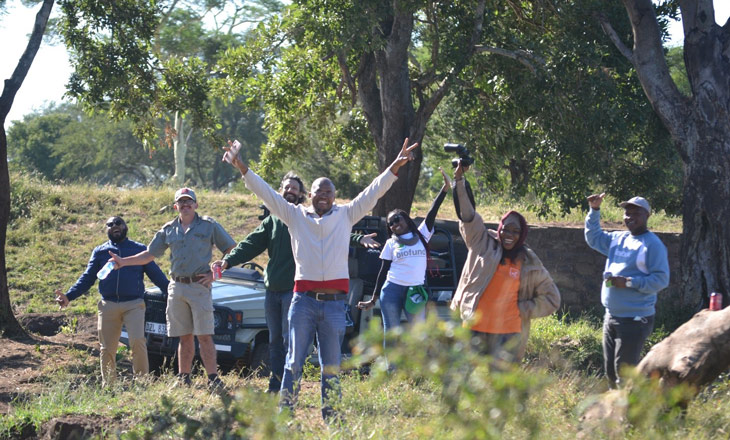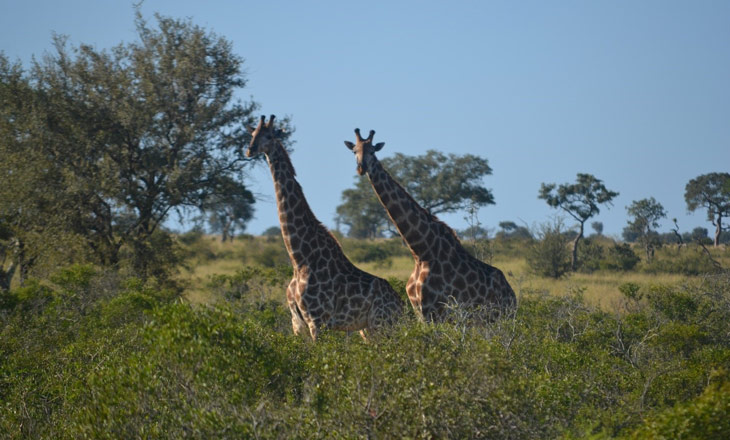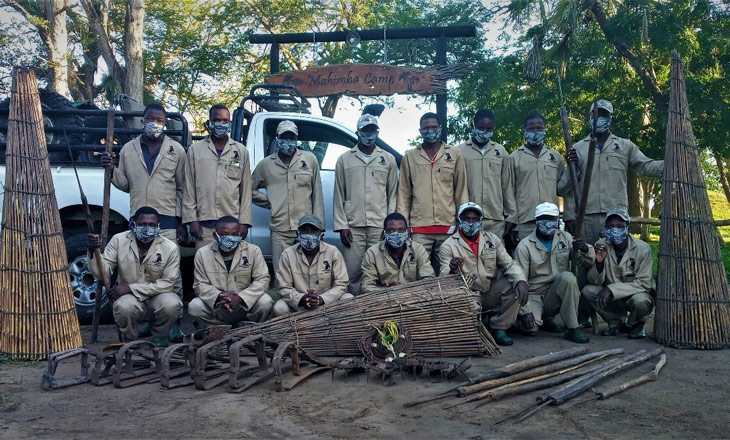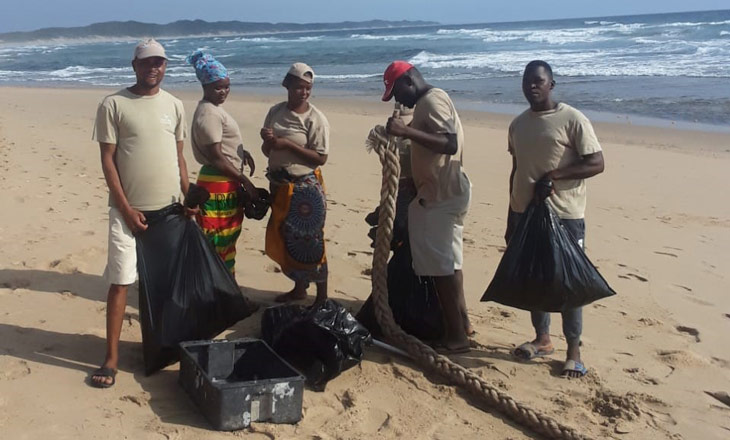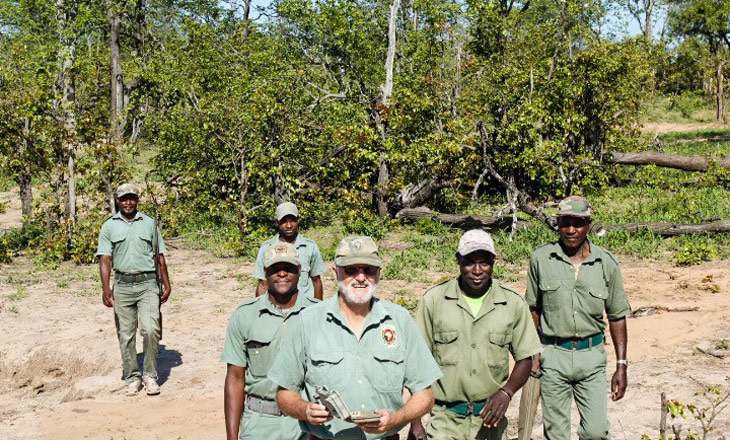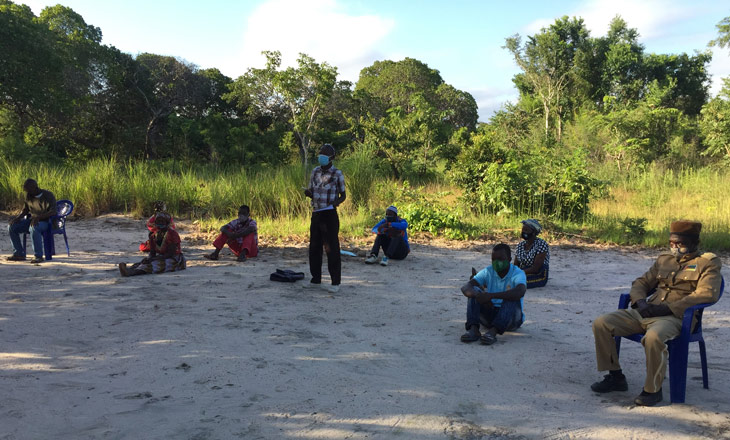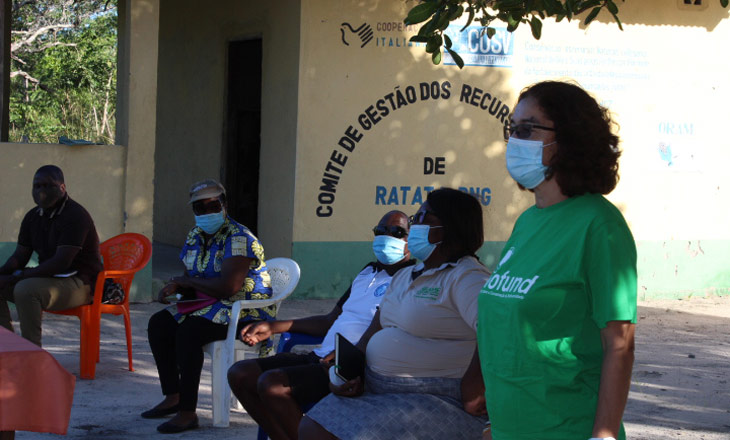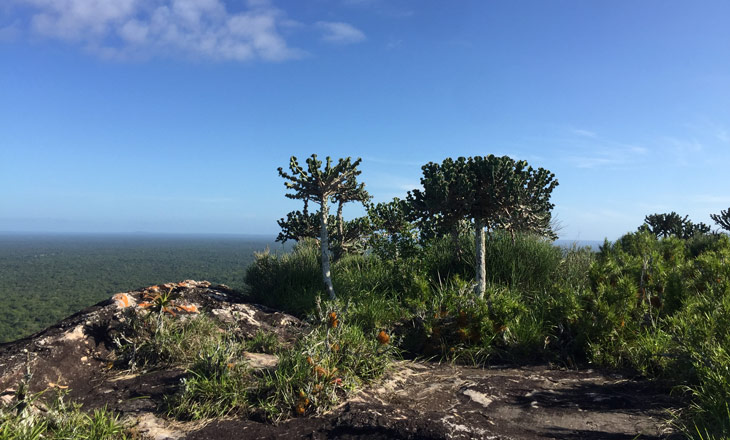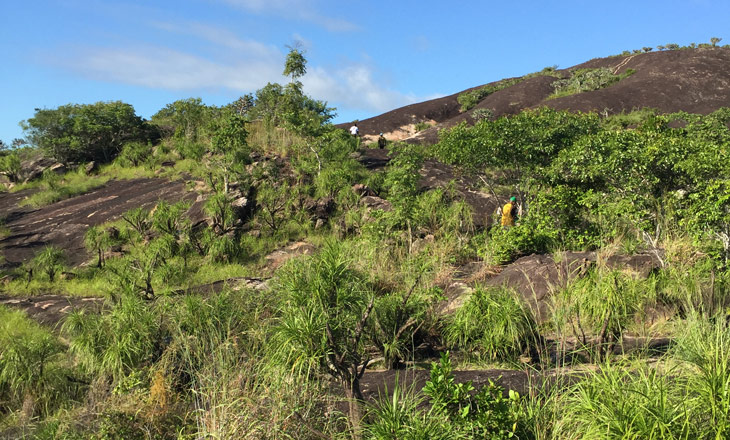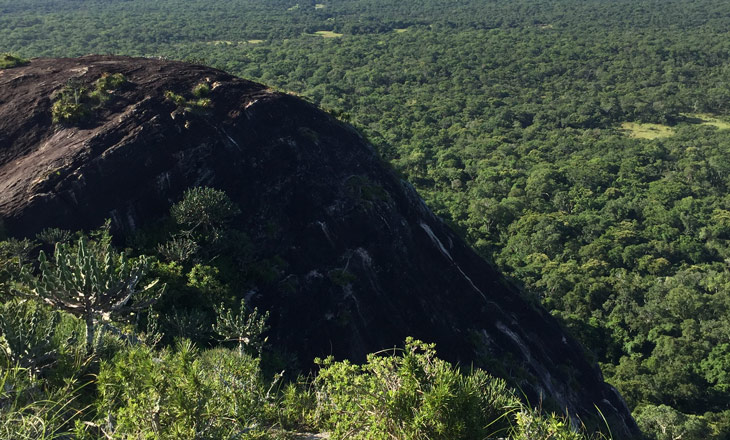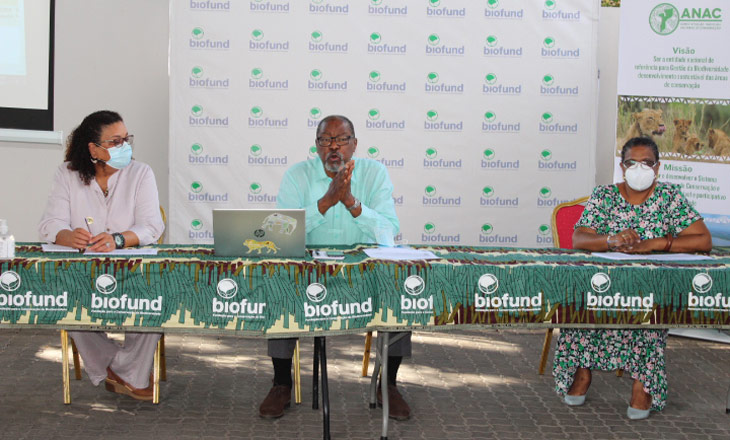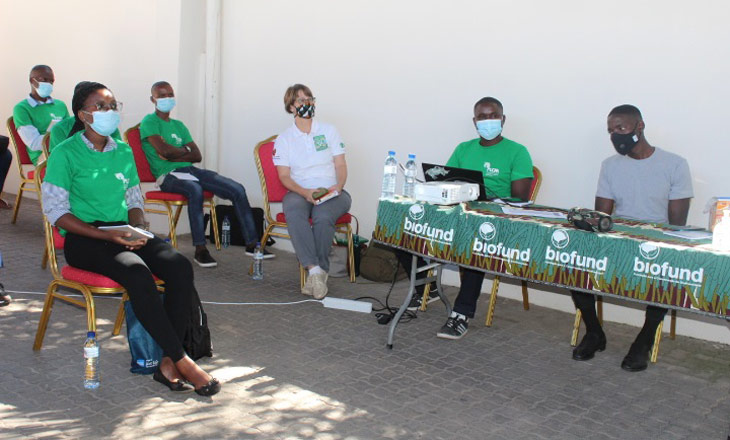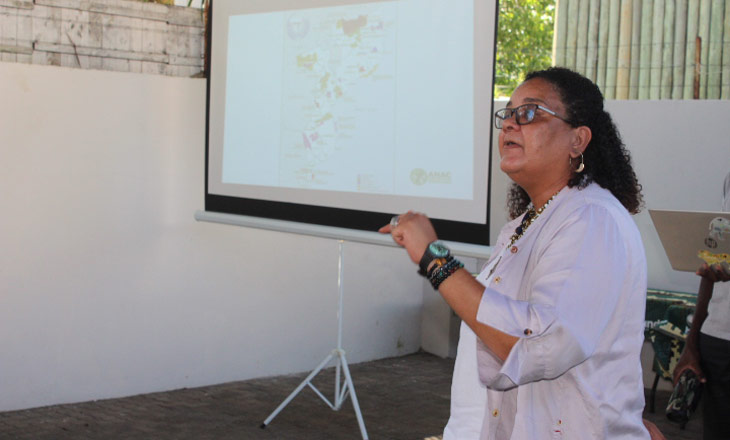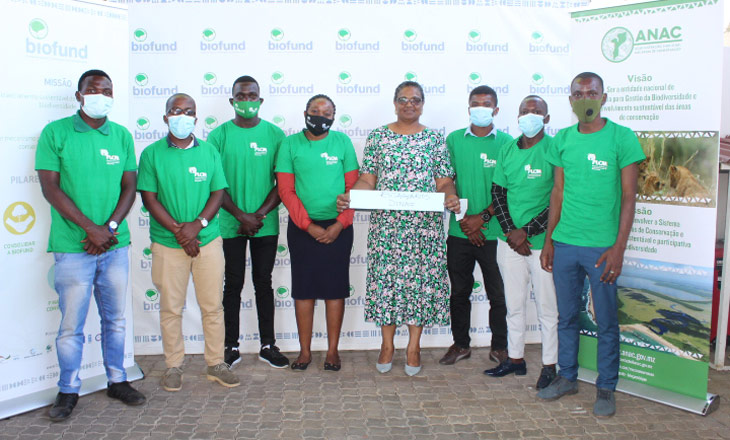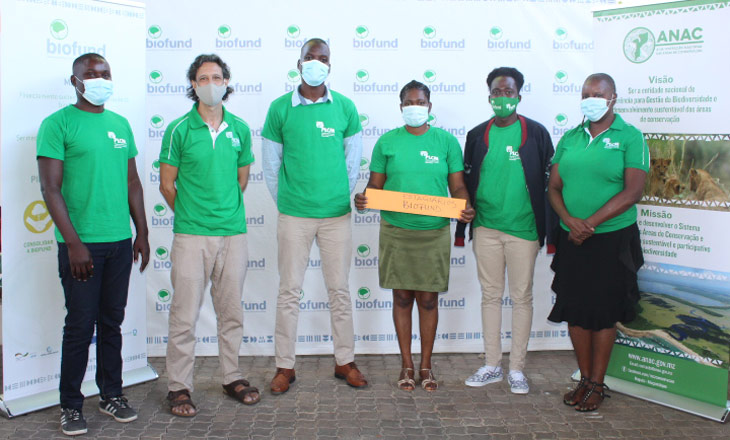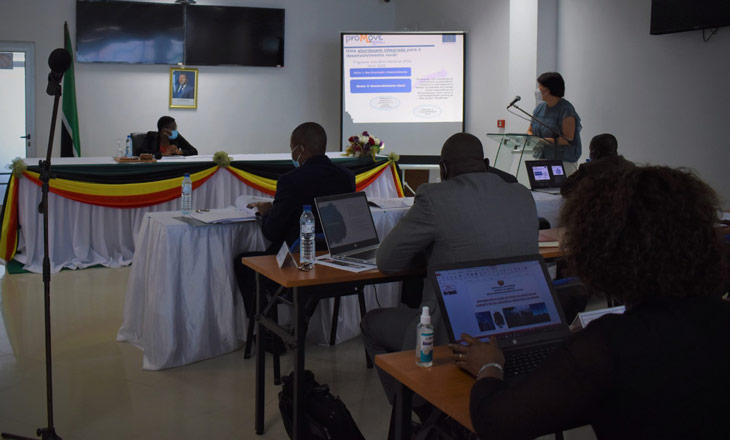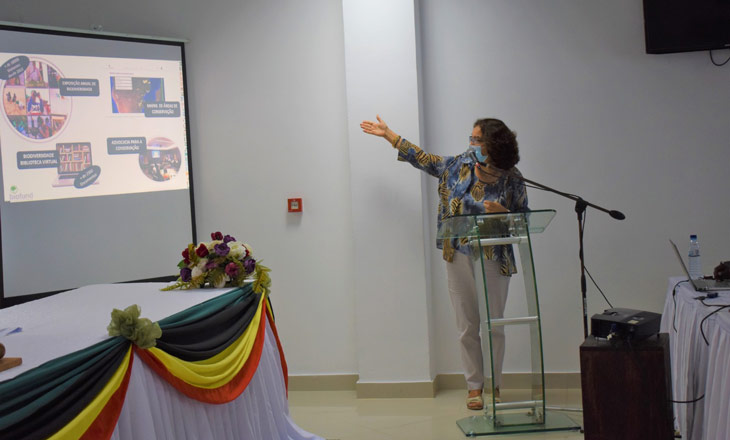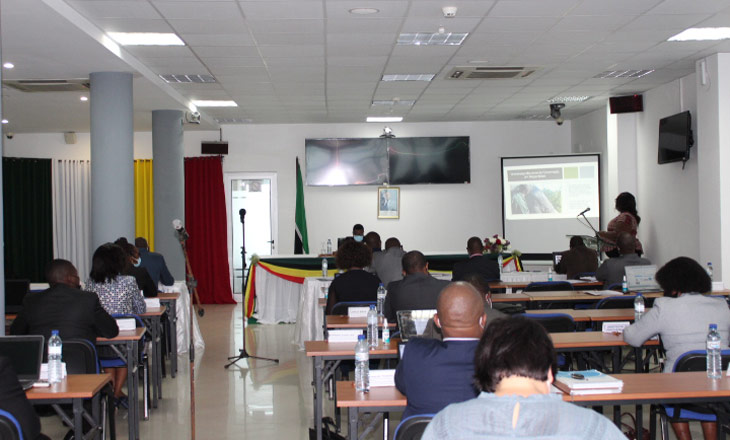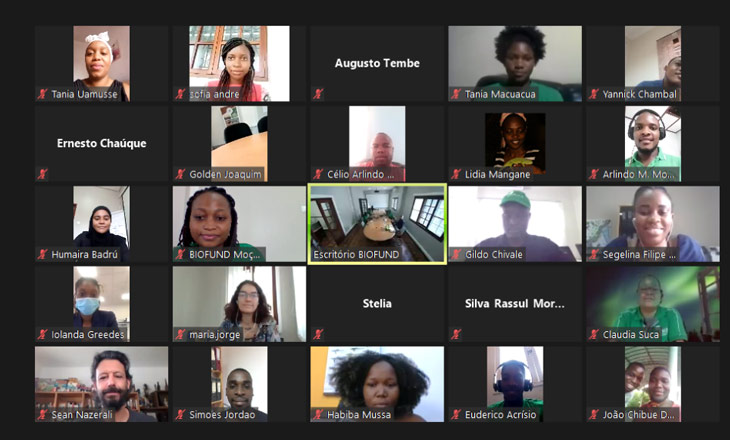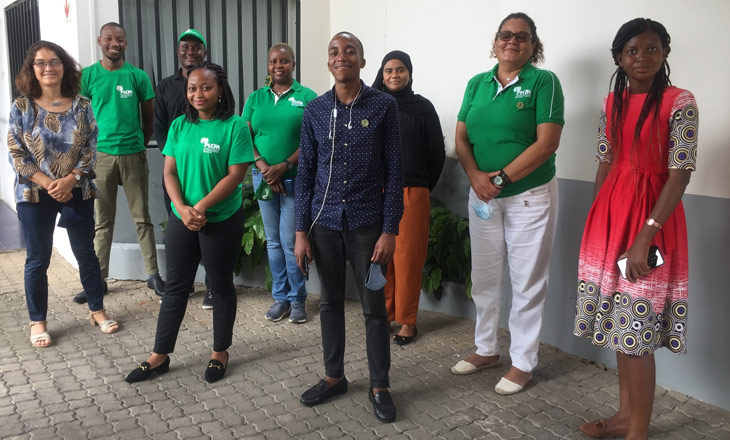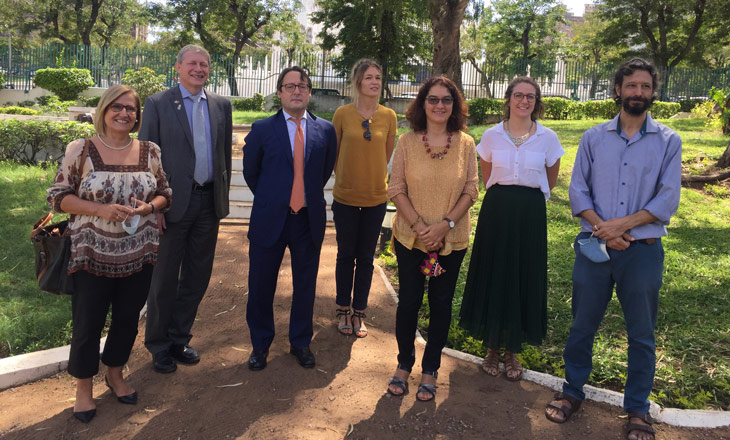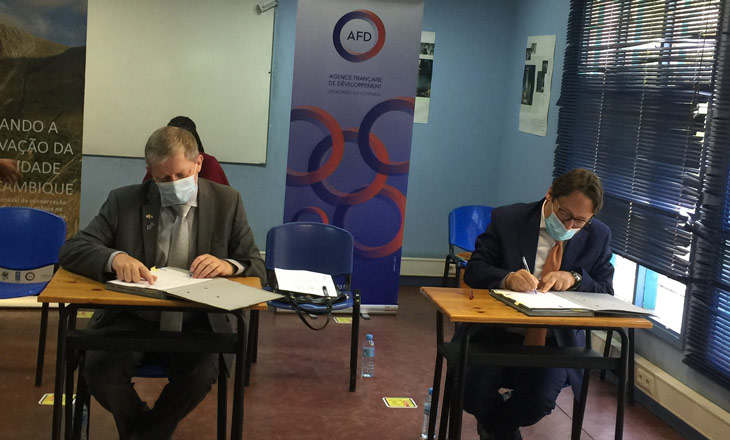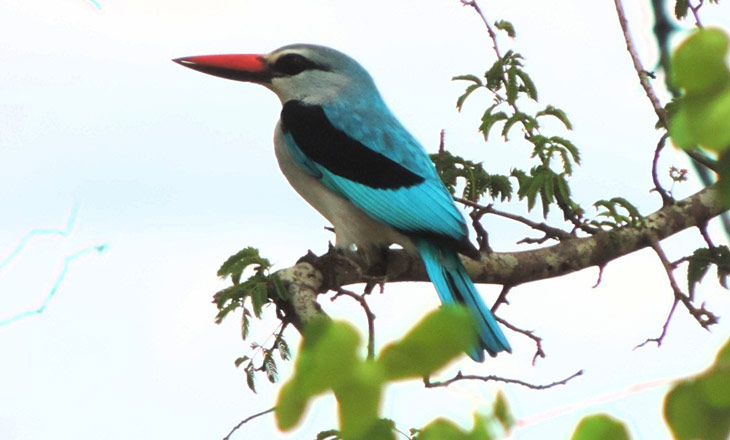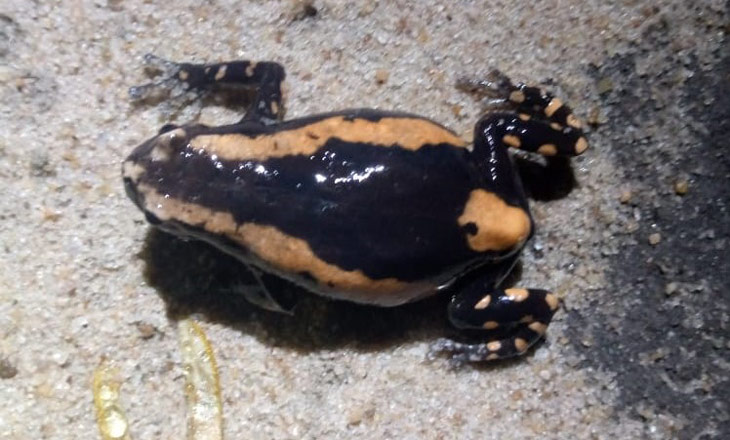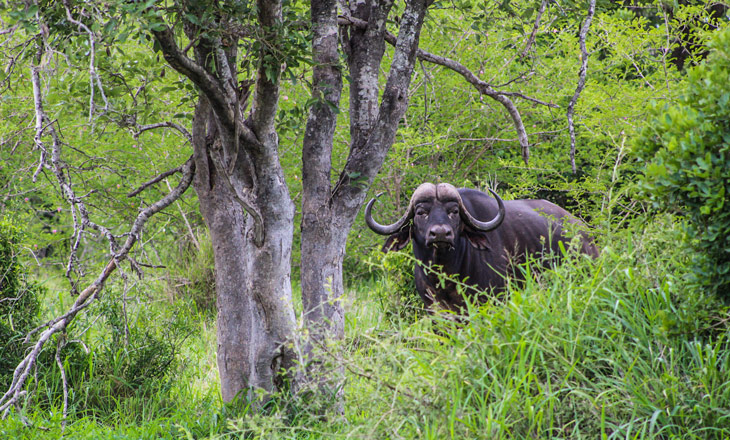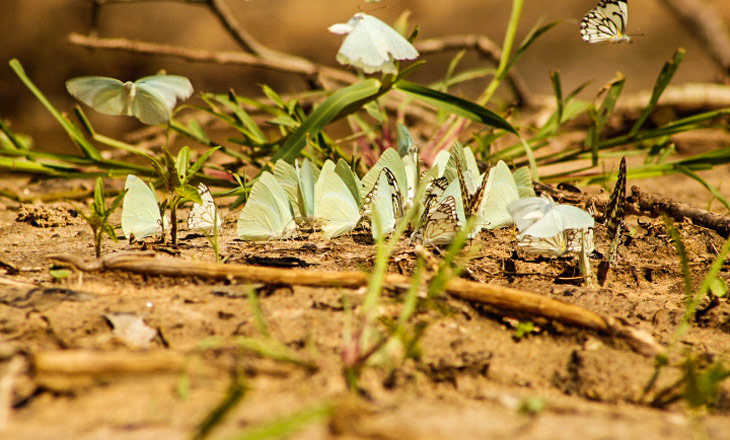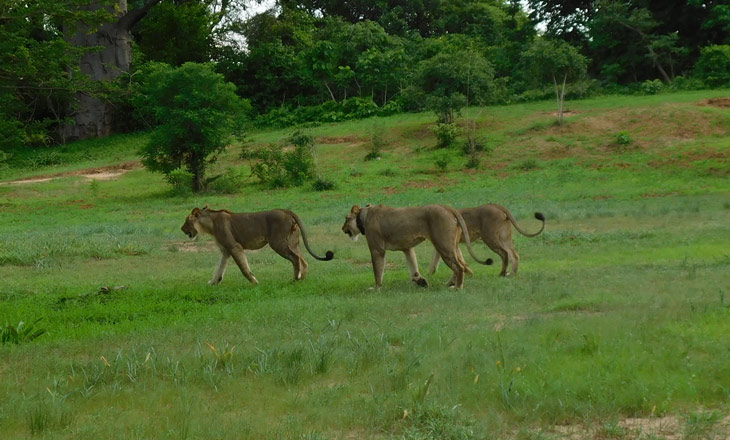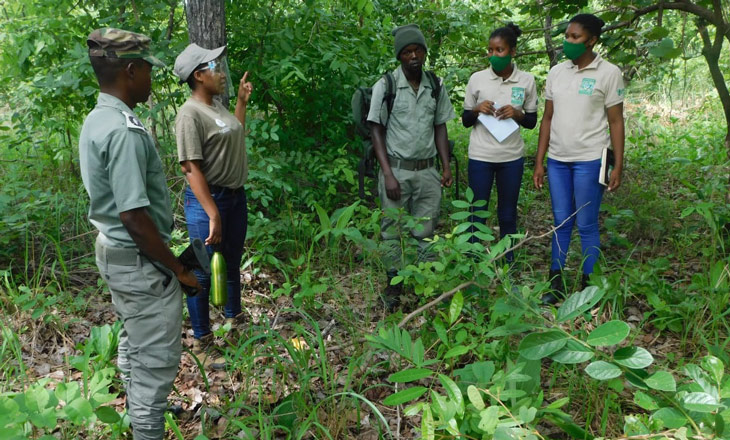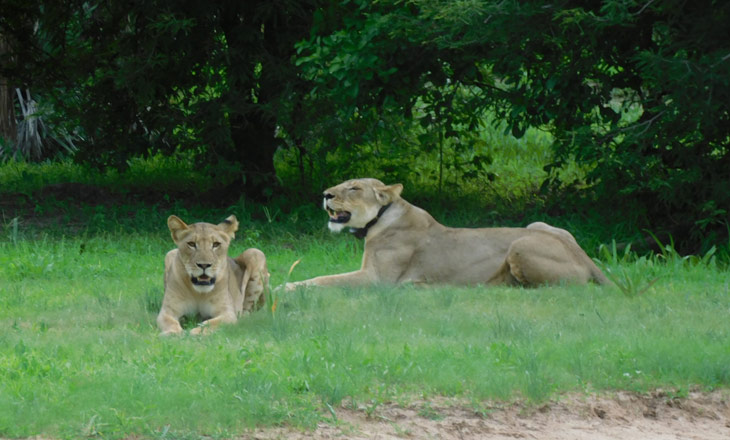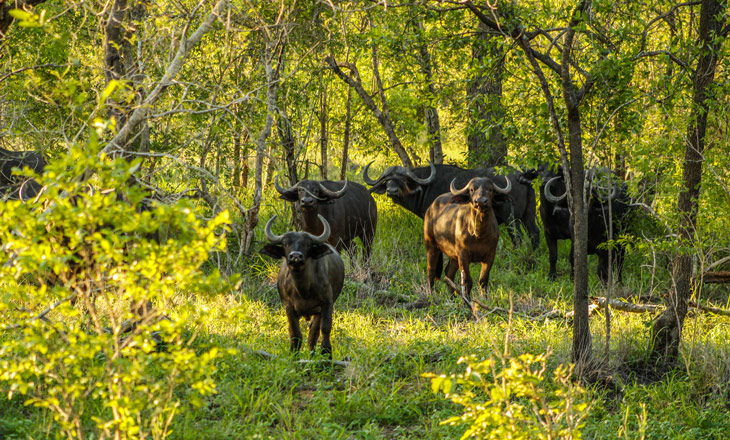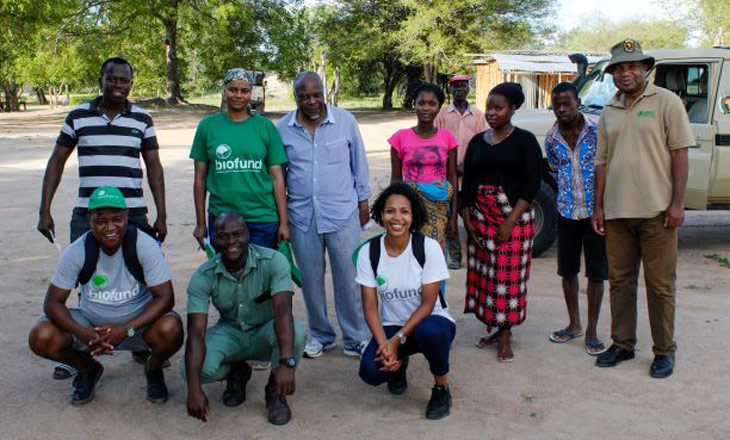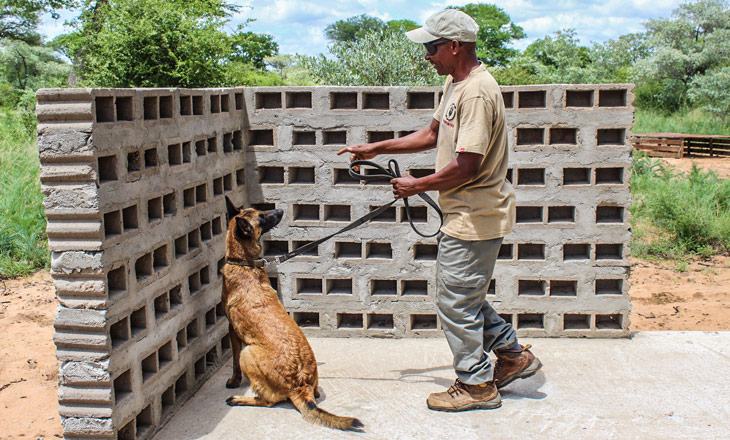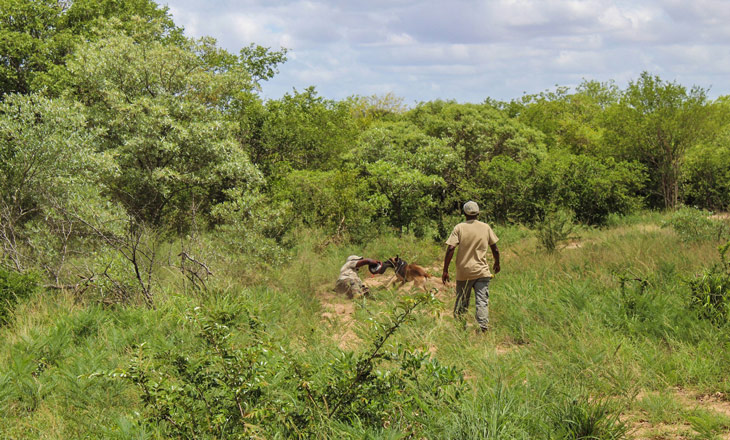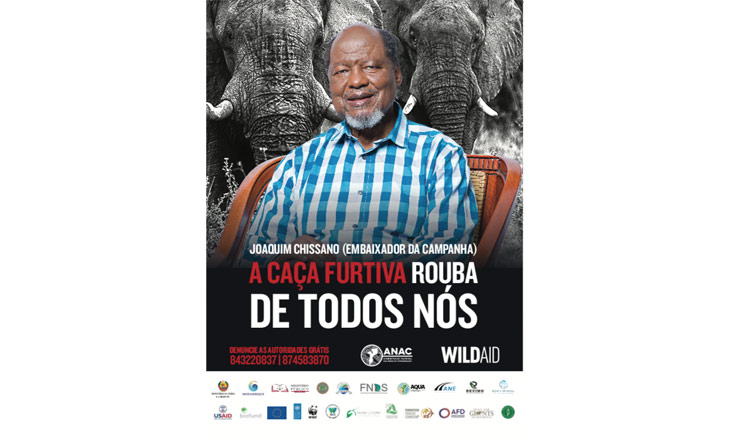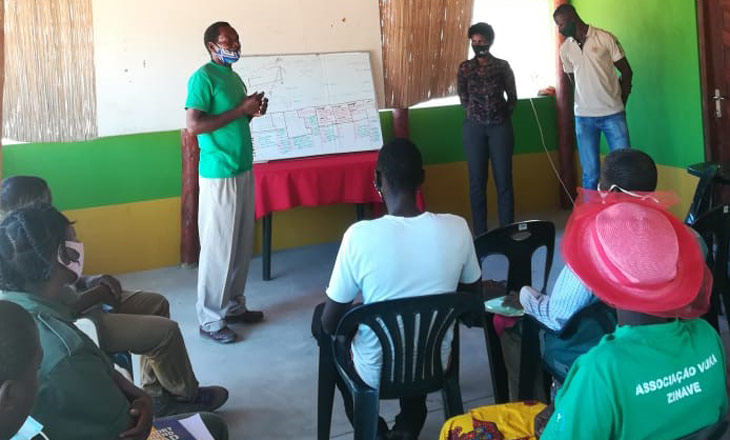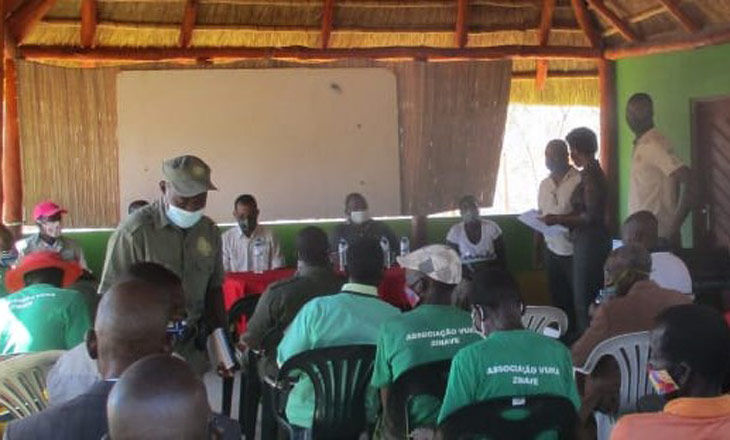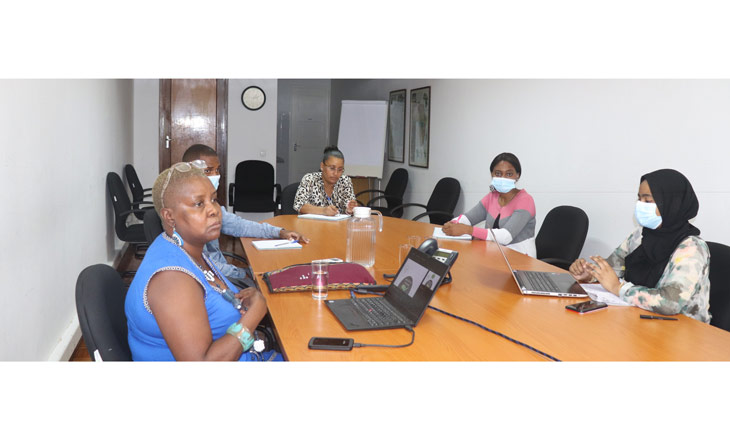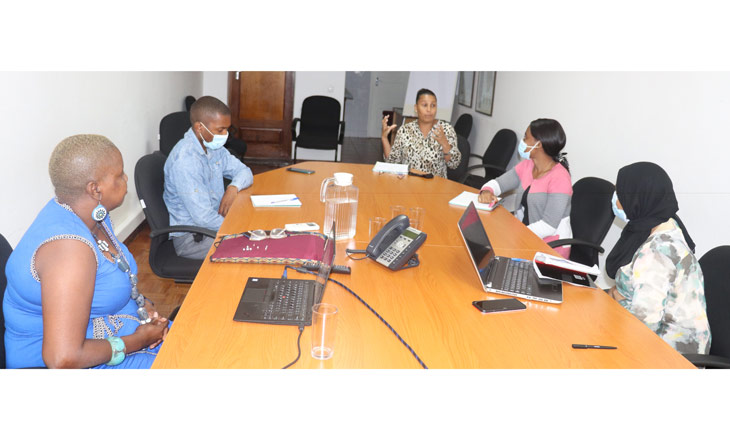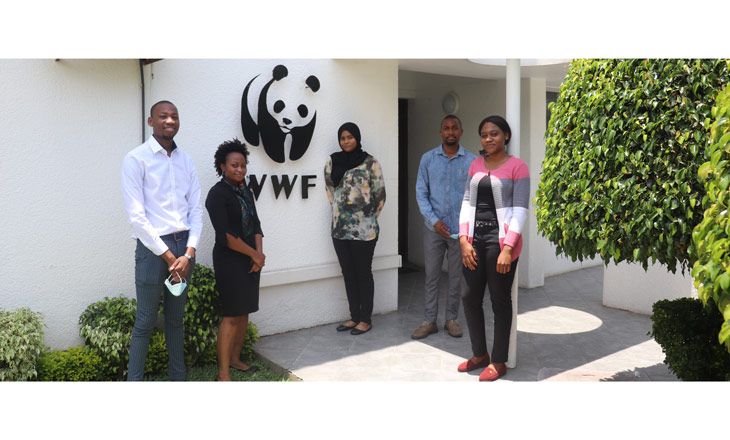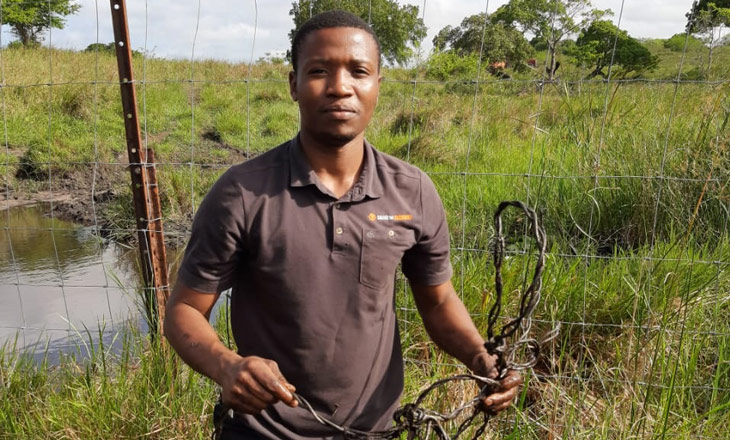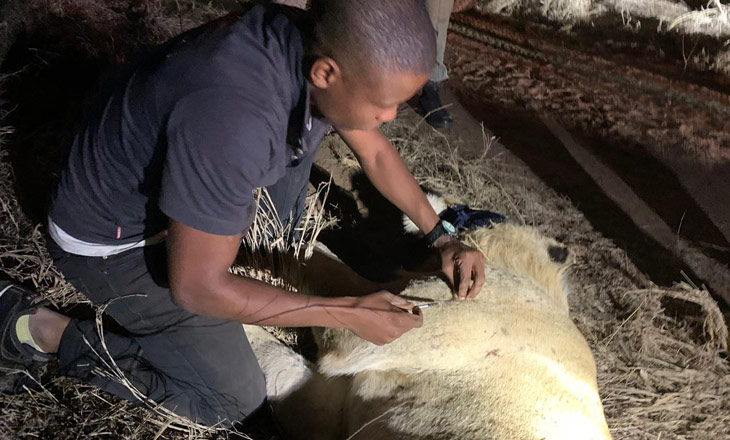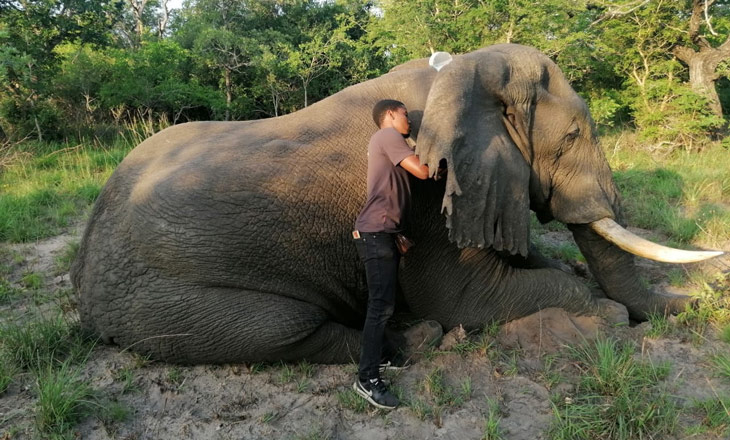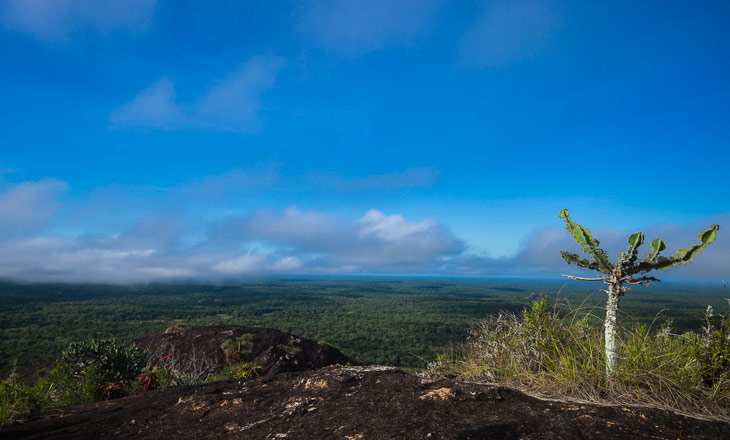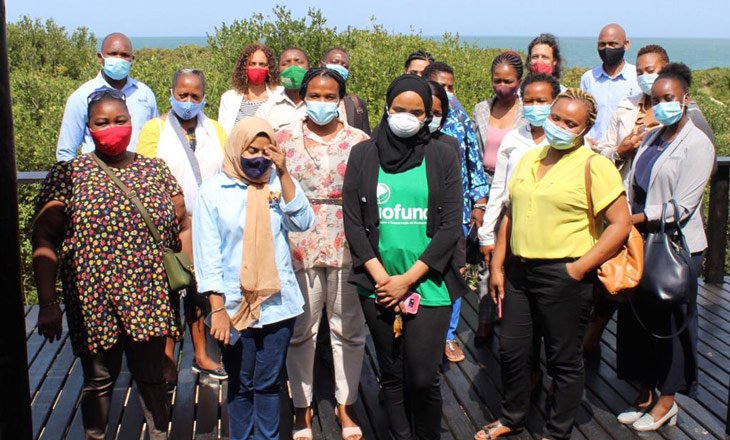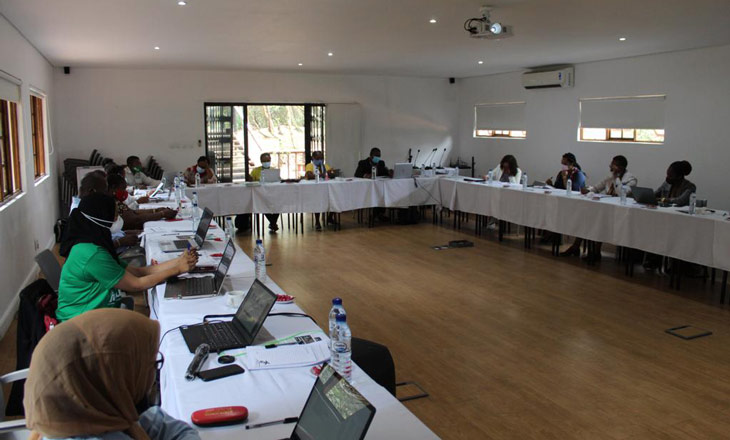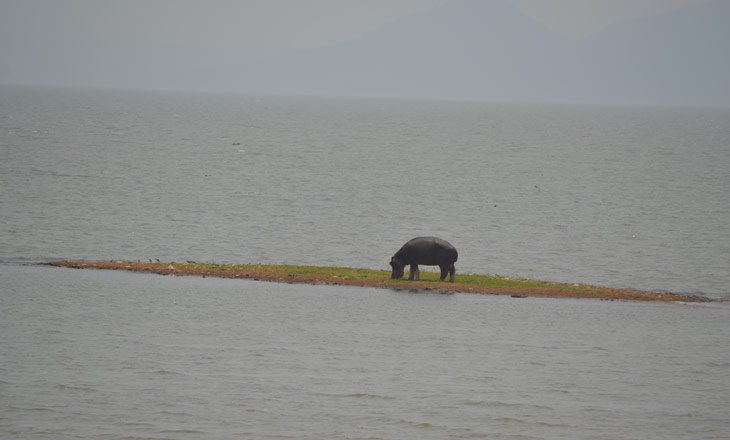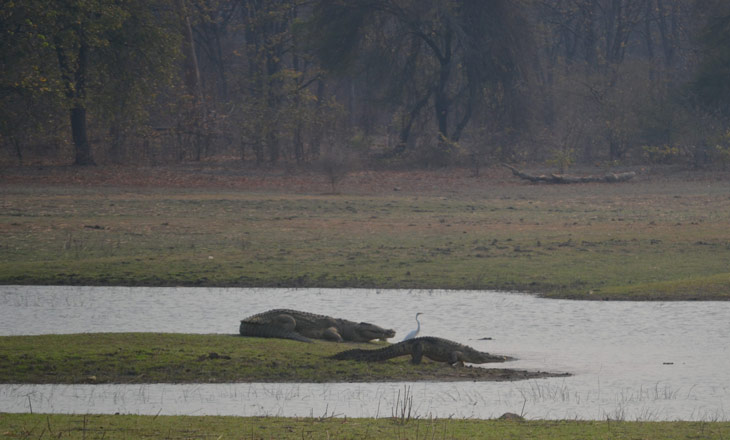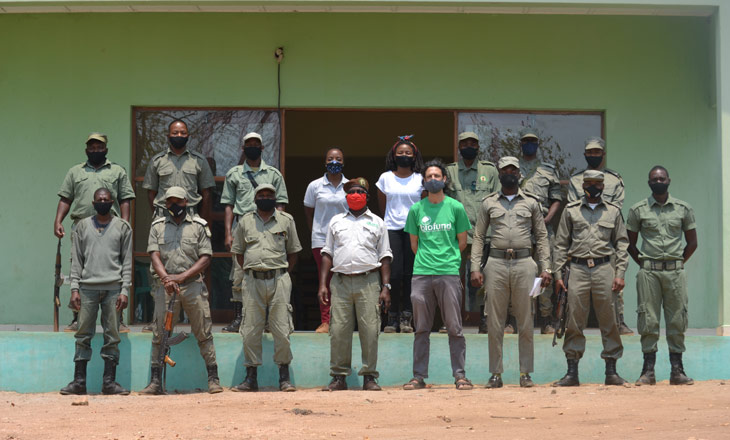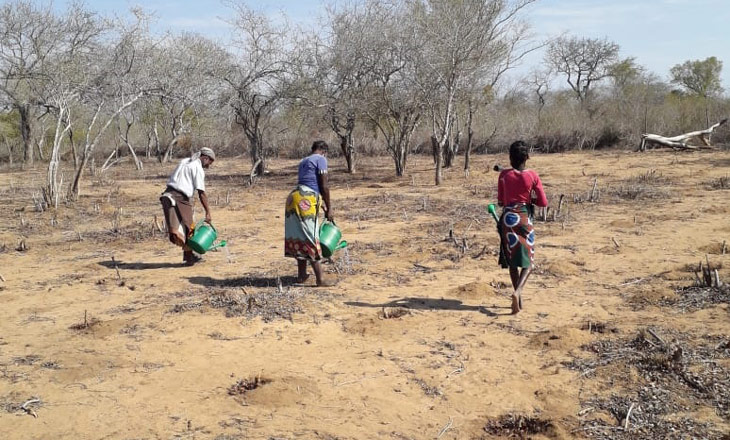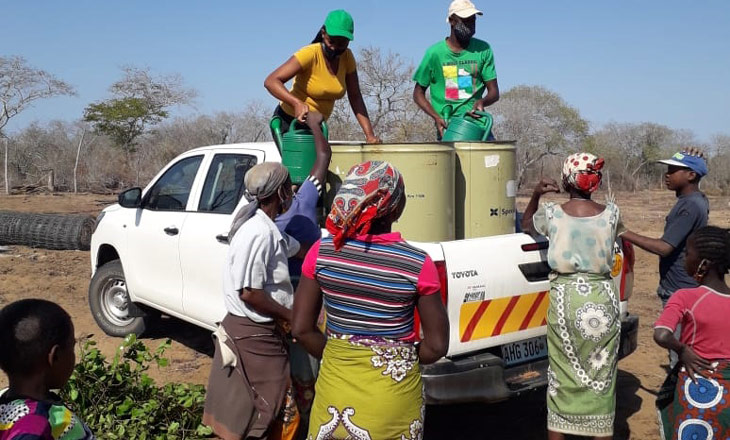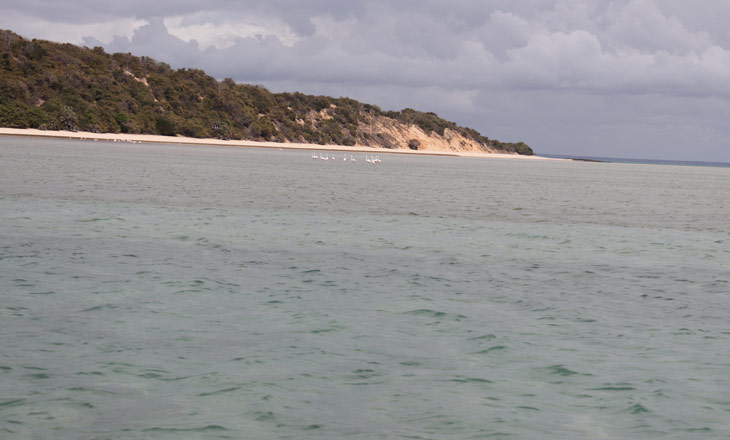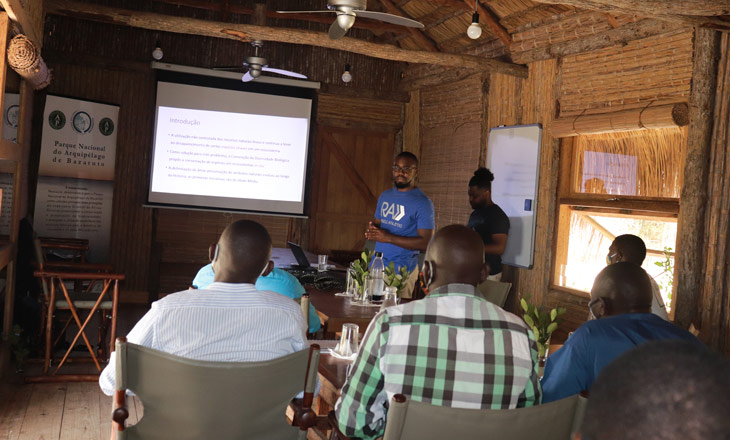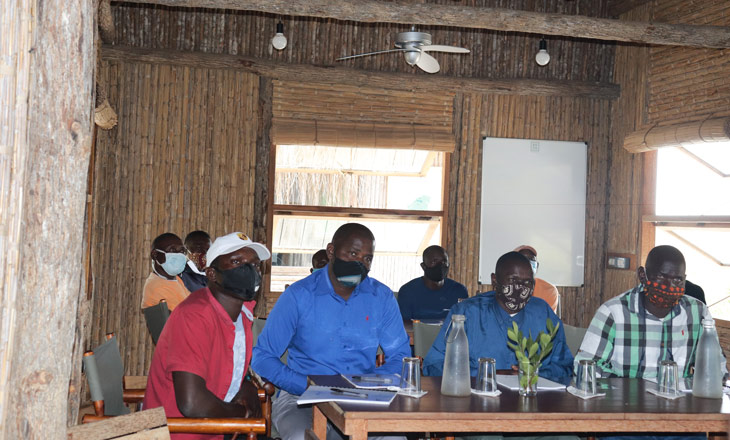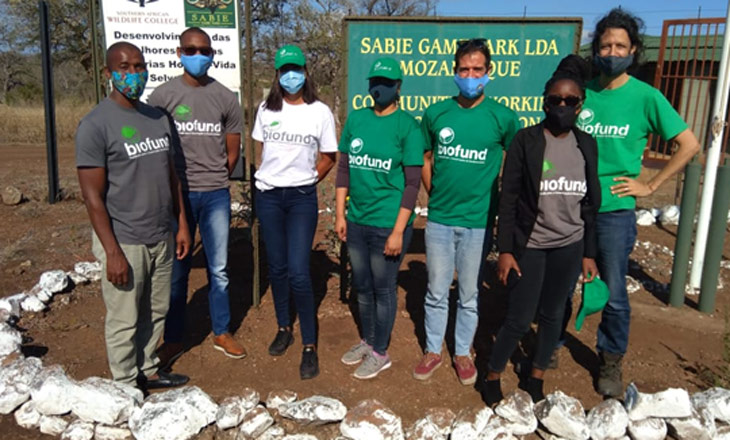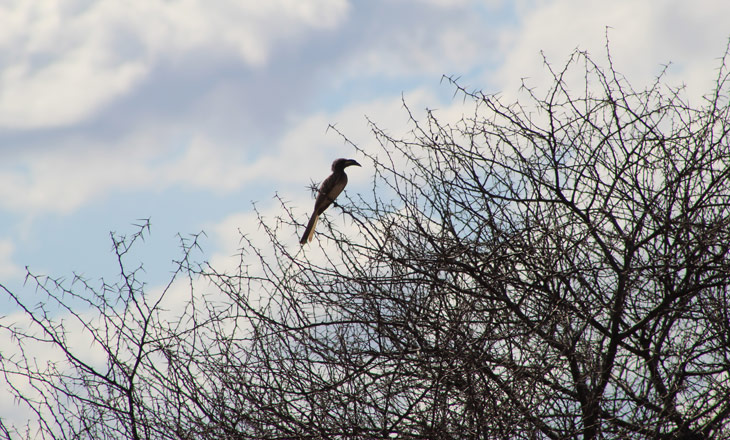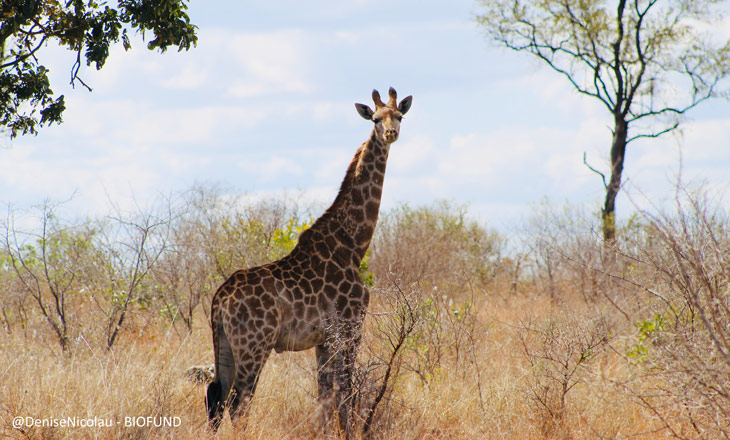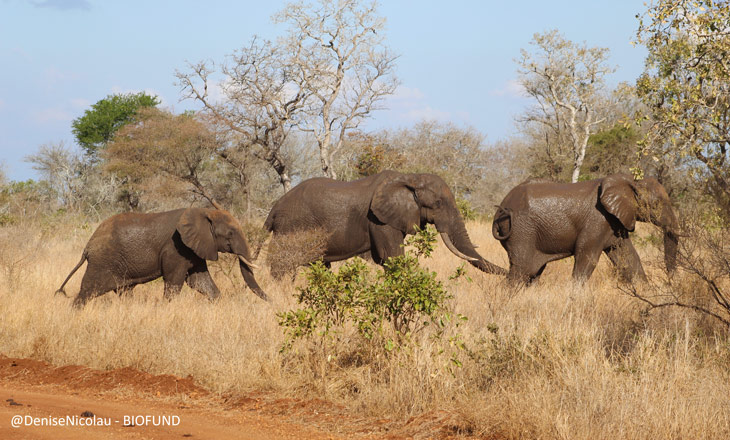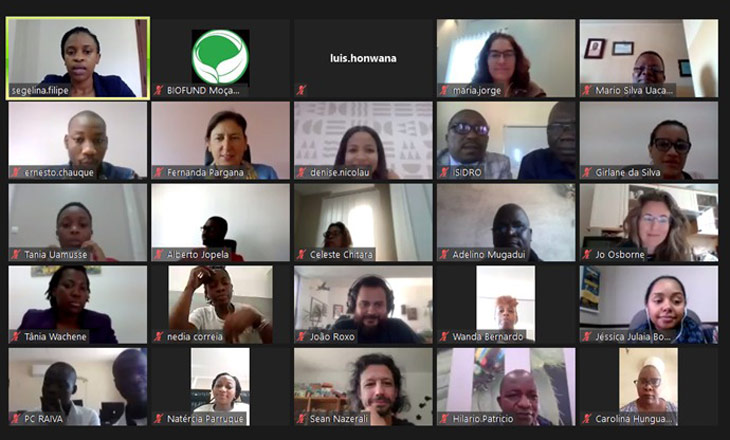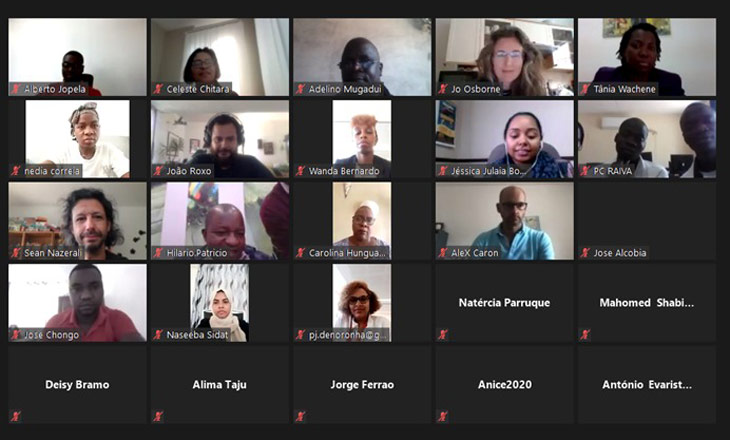This is the consortium formed by WWF, R-CGRN and RADEZA, which will implement the PROMOVE Biodiversidade (“Promote Biodiversity”) project on Mount Mabu. The team, consisting of the BIOFUND Director of Programmes, the coordinator of PROMOVE Biodiversidade and representatives of the consortium, was received in audience on 17 May by His Excellency the governor of Zambézia, Pio Augusto Matos, accompanied by the representative of the Zambezia Provincial Directorate of Territorial Development and Environment. On the occasion, Pio Augusto Matos, expressed his satisfaction with the project, stressing the importance of working in close coordination with the local leaderships, promoting their empowerment and building their capacity, since they are the vehicle that drives and facilitates community actions.
“PROMOVE Biodiversidade” project presents implementation partner to the Zambezia provincial government and to Lugela district
The team was also received on 19 May by the Lugela District Administrator, Maria Carlota Tomás de Melo, who stressed that, if the project is properly implemented, it will have a great impact on the protection and monitoring of the biodiversity of Mount Mabu and on the development of sustainable livelihoods for the local communities. Maria de Melo also stressed the need to coordinate the actions of the various “PROMOTE” projects, in order to stimulate the development of the region, mainly in the areas of infrastructures and agriculture.
The meetings were intended to present the consortium implementing the project for the conservation of biodiversity and community development on Mount Mabu, located in Lugela district in Zambézia province.
The “PROMOVE Biodiversidade” project seeks to contribute to improving the livelihoods of rural communities, through the sustainable management of natural resources, focusing on Mount Mabu, the Gilé National Park, and the Protected Area of the Archipelago of the First and Second Islands (APAIPS), in Zambézia and Nampula provinces. It is financed by the European Union.
To find out more about the “PROMOVE Biodiversidade” project, click here.
Mozambique celebrates International Biodiversity Day with the launch of Key Biodiversity Areas
Under the motto “We are part of the solution for nature”, on 22 May Mozambique celebrated International Biodiversity Day.
Biodiversity is indispensable for the balance of natural ecosystems, and is of great importance for the life and survival of humanity. For example, the variety and balanced use of natural resources make possible the availability and quality of the water we drink, the air we breathe, the foodstuffs we produce, the stability and protection of mountain areas, and the protection of coastal zones, among others.
At a time when natural resources are coming under great pressure, due to socio-economic development, Mozambique is taking a leadership role and, using new procedures, it is identifying, mapping and launching for the first time in the country, Key Biodiversity Areas (KBAs). The KBAs are places which, due to their special characteristics make a significant contribution to the persistence of biodiversity globally, in terrestrial, aquatic and subterranean environments (IUCN, 2016). As a result of this study, 29 KBAs have been identified and mapped. 25 of these are terrestrial and four are marine. They cover a total area of 139,947.05 km2. This activity took place under a partnership between the Ministry of Land and Environment, the Wildlife Conservation Society (WCS), and other partners, including the Foundation for the Conservation of Biodiversity (BIOFUND). It was financed by USAID through the SPEED+ Project. To find out more about the KBAs click here. You can also access the documents in the BIOFUND digital library, here.
Today we are all called upon to contribute to the conservation of biodiversity, since after all “we are part of the solution for nature”.
Small actions, such as planting a tree, or keeping the environment clean, among other practices, can help conserve biodiversity. Do your part and contribute to the conservation of biodiversity!
BIOFUND and its partners increase the funds of the BIO-Emergency Fund and extend its coverage from June to December 2021, guaranteeing the jobs of more than a thousand rangers of the Conservation Areas under public and private management.
The Fund was set up in June 2020, by the Foundation for the Conservation of Biodiversity (BIOFUND), with the aim of reducing the extreme impacts of the COVID-19 pandemic on the conservation areas in Mozambique (public and private areas), by guaranteeing the jobs of the rangers and of essential staff for supporting inspection, which were previously covered by income from tourism. The BIO-Emergency Fund was initially designed to cover a period of one year. However, due to the effects of COVID-19, which continue to have a negative effect on tourism and other sectors, BIOFUND has extended the period covered by the fund to the end of December 2021.
With this extension, more Conservation Areas (ACs) under public and private management, including community areas, will benefit from 100% payment of the wages of the rangers, and of essential support staff in the AC’s as well as the payment of costs directly linked to activities of inspection and patrolling, including preventive material against COVID-19.
Currently, the BIO-Emergency Fund has 26 beneficiaries. Of these, 13 are Conservation Areas under private management, 11 are Conservation Areas under public management, and 2 are Community Conservation Areas. The Fund is guaranteeing the jobs of more than 1,000 rangers, and has already disbursed 103.896,002 (one hundred and three million, eight hundred and ninety six thousand, six hundred and two) Meticais from June 2020 to April 2021. With this support for the Conservation Areas, more than 13,139,211 hectares of biodiversity are being protected, equivalent to 63% of the total protected area in the national territory.
BIOFUND and BCI visit first conservation project supported with funds from the Bio card
With the aim of seeing up close the activities that are being undertaken with the funds from the Bio card, a project resulting from a partnership between the Foundation for the Conservation of Biodiversity (BIOFUND) and the Commercial and Investment Bank (BCI), teams from BIOFUND and the BCI recently visited the Sábiè Game Park, the Conservation Area where the first pilot project financed with funds from this card has been implemented, for the conservation of white and black rhinoceros, which are species threatened with extinction in Mozambique. This project, designed by MozParks Initiative INC., supported the placing of satellite tags in order to better follow and protect these species.
The BIOFUND team, consisting of the Director of Innovative Financing, an accountant, an administrative Assistant and a Monitoring and Assessment Officer, together with four BCI staff, had the opportunity to view a unique landscape and were also fortunate enough to see various animal species that are part of the Sábiè Game Park.
Sean Nazerali, the BIOFUND Director of Innovative Financing, stressed that, regardless of the area of work. BIOFUND makes a point of ensuring that all its workers have opportunities to contact the nature of the grass roots work of the institution, so that they understand the importance of conservation. Hence the fact that professionals who have no technical training in conservation formed part of this visit.
For the BCI team, who were visiting a Conservation Area for the first time, this contact with nature was doubtless very important for raising their awareness about the conservation of biodiversity and the intervention of BIOFUND in this sector. It is striking to see the commitment of all these professionals to conserving biodiversity. I am pleased to now that the BCI is participating in this cause that is so useful to our ecosystem – added Esménia Nhane of the BCI.
It should be recalled that the funds from the Bio card are exclusively a contribution from the BCI, driven by the action of its clients who, in choosing to use the Bio card are contributing so that a percentage of a value of the transactions made through this card are channelled to BIOFUND for the implementation of projects which seek to conserve biodiversity, without any additional cost for the BCI’s clients.
For more details about the Bio Card, click here
BIOFUND publishes report from the 1st Survey on the Impact of COVID-19 on the Conservation Areas under private management, in the framework of the BIO-Emergency Fund
The Foundation for the Conservation of Biodiversity – BIOFUND, in the framework of the BIO-Emergency Fund programme, in March 2021 held a survey among private sector beneficiaries with the purpose of assessing the impact of the COVID-19 pandemic on the conservation of biodiversity and the management of the Conservation Areas. The survey was undertaken through an online questionnaire with open and multiple choice questions.
According to the survey results, in 2020 hunting tourism and ecological tourism were the areas most affected by the pandemic, and inspection and patrolling operations were the least affected. This reduced impact on patrolling and inspection activities is due to the start of support from BIOFUND and its partners (through the BIO-Emergency Fund), which has guaranteed the payment of the wage and operational costs of the rangers and support staff in the Conservation Areas, as well as support for the local communities.
Although, since the outbreak of the pandemic, there has been progress in health terms, such as the appearance of vaccines, the future of the operations of the Conservation Areas is still uncertain. In a universe of 13 (thirteen) private sector areas benefitting from the BIO-Emergency Fund (including 1 community area), 60% say they do not have enough money to keep their areas functioning after the end of support from the Fund, envisaged for June 2021. In this context, BIOFUND is studying with its partners possible ways of extending this fund until December 2021.
For access to the report on the impact of the COVID-19 pandemic on the private Conservation Areas benefiting from the BIO-Emergency Fund, click here.
Currently there are 25 beneficiaries from the BIO-Emergency Fund, of which 12 are Conservation Areas under private management, 11 are Conservation Areas under public management and two are Community Conservation Areas. They cover 63% of the protected area of the entire country.
To find out more about the BIO-Emergency Fund, click here.
Ratata Management Committee creates alternative solutions for income generation to relax the pressure on natural resources in the Gilé National Park
Set up in 2010, the Ratata Natural Resources Management Committee, is located in the buffer zone of the Gilé National Park (PNAG), on the side of Impaca locality, in Pebane district and it is working in coordination with the Park, to find sustainable alternatives that seek to improve the livelihoods of the more than five neighbourhoods which accommodate about 7,000 households.
The Committee has benefitted from support from partners to strengthen its role in the work of raising community awareness about the conservation of natural resources, as well as strengthening the economic and productive activities of Ratata. In 2020, the Gilé National Park held training sessions about bee-keeping, non-timber forestry resources, driving animals away, and managing conflicts between people and wild life.
Other activities being undertaken in this committee, with the communities, concern the promotion of savings and strengthening the value chain of the agricultural materials produced by the community. It should be mentioned that this is a legalised committee, it has a bank account and it creates ways of generating incomes and sustainability through collecting enrolment and monthly membership fees from the members.
This information was shared during a recent visit by workers of the Foundation for the Conservation of Biodiversity (BIOFUND) and staff of the National Administration of Conservation Areas (ANAC), to the Gilé National Park under the project “PROMOVE Biodiversidade”, which seeks to cover three components: (a) the Conservation of Biodiversity; (b) Community development, and (c) Studies and research, which obey priorities that will be identified in coordination with the PNAG Administration. The component of conservation of biodiversity is managed by the FFS-IGF Foundation through direct support to the Gilé National Park.
Also in the context of “PROMOVE Biodiversidade”, the PNAG intends to hold training sessions in matters of conflict management and of running associations in order to improve the operations of the Ratata Natural Resources Management Committee and similar committees in the region.
Mount Pope and its unique landscape: a tourism attraction to discover in the Gilé National Park
High trees, a variety of plant species and bird song that enchants those who enter the forest in the Gilé National Park, in Zambézia province. But after an hour’s drive from this unique moment, there arises a new horizon which, with a magical stimulus, awakens the desire to see where those mountainous formations, discovered (documented) for the first time in 1920, end. Thus begins the climb to the top of Mount Pope, which is about 265 metres high.
Located in the vastness of the Gilé National Park, which covers 2, 861 km2 and a buffer zone of 1, 671 km2, climbing Mount Pope is a challenge that takes about 45 minutes. This is a journey that can only be made on foot, and in the company of a guide, because the rock strewn path also possesses some secrets only known to those who have been there before.
It is possible to make a small stop halfway up the path, but at that point the desire to reach the top is so great that to stop would be to delay a desire which is already running high.
Since it is part of the Gilé National Park, its vegetation includes a great wealth of flora, including many of the dominant species of the miombo forest.
During the climb, it is possible to contemplate a landscape formed by a mosaic of forest and grassland. The water running between the stones, mixed with the sounds of small insects, provides a captivating soundtrack for reaching the top of the mountain. And, speaking of the top of Mount Pope, after reaching there, there is no doubt that Mother Nature is a perfectly divine present. A landscape that remains engraved in the memory of those who reach there!
If you pay attention to our social networks, you will learn more about the biodiversity of Mozambique.
Beneficiaries of the 2nd edition of the PLCM pre-professional internships ready to begin their activities
The Foundation for the Conservation of Biodiversity (BIOFUND), in partnership with the National Administration of Conservation Areas (ANAC) and the National Forestry Directorate (DINAF), on 6 April held the induction of interns at central level, from the 2nd edition of internships of the Mozambique Conservation Leadership Programme (PLCM). The 16 young people, including five women, have been trained in multi-disciplinary areas such as Law (2), Advertising and Marketing (2), Forestry Engineering (6), Agricultural Engineering (1), Accounting and Auditing (1), Political Science (1), Computing Engineering and Technologies (1), Environmental Engineering (1) and Computer Applications (1). They will be placed in BIOFUND, ANAC, DINAF and the National Sustainable Development Fund (FNDS).
The event also brought together the beneficiaries from the first edition of the scholarship programme, in an exchange of experiences between the future young leaders of conservation.
During the opening of the event, Luís Honwana, the Executive Director of BIOFUND, said that, with the Mozambique Conservation Leadership Programme (PLCM), BIOFUND intends to give young people an opportunity to understand their role in the conservation of biodiversity, and particularly to raise awareness about the need to involve all sectors in the conservation of biodiversity.
Alima Issufo, the representative of DINAF, in addition to transmitting the expectations of the institution to the interns, shared the story of her own career. Just like the selected youths, she began as an intern, but has now been working in the Department of Forestry Management for more than 20 years.
During the event, the beneficiaries were able to hear about the institutions where they will work as interns, and to take part in group dynamics that will allow involvement and learning about biodiversity and the country’s Conservation Areas. There was also room for sharing experiences with former interns of the programme who are part of the teams of workers of BIOFUND and of ANAC.
“I am very happy to be part of the PLCM. Out of more than a thousand candidates, I was chosen! As a young person, I will do my best during the period of internship” – Iolanda da Conceição Carvino Chibamo, trained in forestry engineering, who will be an intern in DINAF.
“As a youth, I know that I can do a great deal for the conservation of biodiversity. I hope to use my potential to influence other young people with the experience that I shall acquire during this internship” – Betuel Virgílio, trained in Law, and who will be an intern at ANAC.
This is the second edition of pre-professional internships implemented by the PLCM. The first edition took place between February 2020 and February 2021, benefitting 19 young people at central level and in the Conservation Areas.
BIOFUND, ANAC and the European Union present the project “PROMOVE Biodiversidade” in Zambézia province
In order to raise awareness about “PROMOVE Biodiversidade”, the Foundation for the Conservation of Biodiversity (BIOFUND), the National Administration of Conservation Areas (ANAC) and the European Union, on 30 March 2021, presented the project “PROMOVE Biodiversidade” to the Council of Representation of the State Secretariat of Zambezia Province.
The meeting, chaired by the Secretary of State for Zambezia Province, Judith Mussácula Faria, was attended by representatives of the various bodies in the province, who were enthusiastic about the prospects for the start of the project “PROMOVE Biodiversidade”.
In her speech, Judith Mussácula Faria said the fact that the project “PROMOVE” covers a variety of components will allow greater benefits for the target areas. She added that community involvement is indispensable in identifying the best solutions for the conservation of biodiversity.
BIOFUND will manage about 10.2 million Euros while 2.2 million Euros will be managed by the Mozambican government through ANAC.
Cidália Mahumane, the Director of Planning, Cooperation and Studies of ANAC, said that, through Component 1 of the project “PROMOVE Biodiversidade”, it is expected to strengthen the governance framework of the institutions that handle natural resources, with special focus on the Administrative Authority of the Convention on International Trade in Endangered Species of Wild Fauna and Flora (CITES) through the creation of mechanisms to involve academic and research institutions in the implementation of the CITES Convention.
For Alexandra Jorge, the BIOFUND Director of Programmes, this meeting has made it possible to create an involvement with the local government, so that the local authorities contribute towards attaining the results of the project, which will cover three target areas in Zambezia and Nampula provinces: the Gilé National Park, Mount Mabu and the Environmental Protection Area of the First and Second Islands (APAIPS), in the components of conservation of biodiversity, community development and research.
In the case of the Gilé National Park, there are many challenges for biodiversity, characterised by illegal extractive activities by the local population, as well as by outsiders, including uncontrolled bush fires which occur every year in the area and destroy much of the fauna and flora. Commercial logging and the exploitation of mineral products are also a major challenge in the buffer zone of the Gilé National Park.
According to the representative of the European Union and manager of “PROMOVE Biodiversidade”, Aude Guignard, this project is part of the PROMOVE programme, set up in 2018 through an agreement between the European Union and the Mozambican government. The overall PROMOVE programme has a total budget of 360 million Euros and covers PROMOVE-Nutrition, PROMOVE-Energy, PROMOVE-Roads, PROMOVE-Health, PROMOVE-Trade and PROMOVE-Biodiversity. PROMOVE-Biodiversity began in 2019 and has a budget of about 13 million Euros.
The overall goal of “PROMOVE Biodiversidade” is to contribute to sustainable economic growth, and to the reduction of poverty and vulnerability (against the impacts of climate change), through the sustainable use of natural resources, with an implementation period of five years.
15 young Mozambicans benefit from scholarships for masters’ degrees through the Mozambique Programme for Conservation Leadership
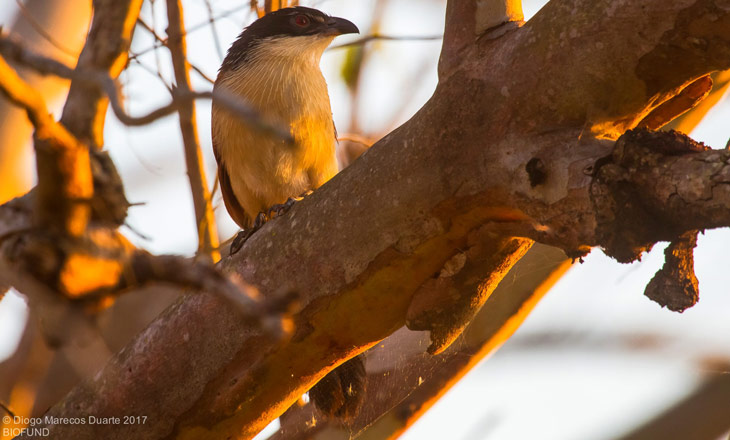
The Foundation for the Conservation of Biodiversity (BIOFUND), through the Mozambique Programme for Conservation Leadership (PLCM), will finance 15 scholarships for the 2021/2022 academic year.
This is a programme of scholarships for the level of master’s degree, which intends to encourage the training of young students in areas of interest for the Conservation sector, through covering the costs of training and scientific research in the Faculty of Agronomy and Forestry Engineering (FAEF) of the Eduardo Mondlane University (UEM), the Faculty of Environmental Engineering and Natural Resources (FEARN) of the Zambezi University (UNIZAMBEZE) and the Faculty of Natural Sciences (FCN) of the Lúrio University (UNILÚRIO). The PLCM has allocated five scholarships to each university.
The scholarships are for the Master’s courses in the Management and Conservation of Biodiversity, Rural Development, Territorial Planning and the Conservation of Biodiversity, Environmental Management and Water Resources, Applied Ecology and the Management of Organisations and Corporate Responsibility. The scholarships are for recently trained young people, aged between 23 and 27 (including four girls) from the provinces of Maputo, Gaza, Inhambane, Sofala, Zambézia, Manica, Nampula and Cabo Delgado. These young people were selected through rigorous criteria after applying via a public tender launched by the PLCM in November 2020.
The PLCM is a programme of BIOFUND financed by the Mozbio2 project (World Bank), which seeks, among other objectives, to motivate and attract young people to conservation. To this end, the PLCM has created three programmes:
- Programme of Research Subventions;
- Programme of Pre-professional Internships, and;
- Scholarship programme.
To learn more about the opportunities and results of the PLCM, click here.
UEM and BIOFUND sign Memorandum of Understanding to strengthen activities in support of the conservation of biodiversity
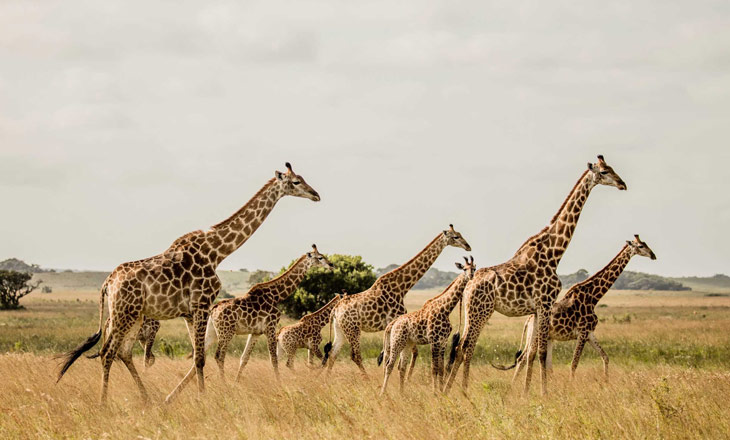
The Eduardo Mondlane University (UEM) and the Foundation for the Conservation of Biodiversity (BIOFUND) recently signed a Memorandum of Understanding for the creation of synergies in support of activities to conserve biodiversity in Mozambique.
This Memorandum of Understanding envisages collaboration in the development of policies related with sustainable economic development and the conservation of biodiversity, the promotion of research oriented towards supporting the conservation of biodiversity, building the capacity of government staff, civil society and the private sector in practices of sustainable development and the conservation of biodiversity, and applying the mitigation hierarchy in development projects.
The UEM and BIOFUND will also collaborate in promoting technical training and the transfer of knowledge and technologies in the Areas of Conservation of biodiversity, community development and other similar areas deemed necessary and strategic for the development of the National System of Conservation Areas in Mozambique and in the mobilisation of human and financial resources and awarding scholarships on merit to the best students under the Mozambican Programme for Leadership in Conservation (PLCM).
The present Memorandum of Understanding covers a period of five years and may be renewed automatically for the same period. Currently the two institutions are developing a Plan of Activities in order to define targets and priorities in the short and medium term, which will make greater results possible.
Closing workshop of the 1st edition of the PLCM’s programme of pre-professional internships
Organised by the Foundation for the Conservation of Biodiversity (BIOFUND), in partnership with the National Administration of Conservation Areas (ANAC), the workshop was held in a virtual format on 2 March 2021 and counted on the participation of all the interns of the Programme for Conservation Leadership of Mozambique (PLCM).
Under the theme “The Role and Involvement of Youth in the Conservation of Biodiversity in Mozambique”, the event sought to gather the experiences lived by young people during various conservation activities, as well as sharing lessons learnt and challenges faced to strengthen their careers.
The young interns and other professionals of the sector attending the event swapped experiences and reflected on themes about leadership and community involvement versus success in the conservation sector, as well as the role of young people and the challenges of gender in the conservation of biodiversity in Mozambique. The interns stressed the added value that the programme has brought to their professional careers and its contribution towards improving systems and processes in the internship centres where they have been placed, and in developing the conservation sector in general.
Célio Macheieie, trained in Marine Chemistry and a beneficiary of the programme, stressed that the internship programme awoke within him a greater interest for the conservation sector. “From my training I never thought of working in conservation but, after the PLCM internship, I felt motivated to develop my professional career in this sector”, said this intern.
One of the most striking moments of the ceremony was the election of the PCLM Young Leader of the Year 2020, through a vote of all the interns. The prize, which seeks to distinguish and recognize the young person who has stood out the most during the development of various activities in defence of the conservation of biodiversity was awarded to Natércia Parruque, an intern in the BIOFUND Communication Area. On this occasion, Natércia Parruque said that this recognition has awoken still further her interest in working for the conservation of biodiversity.
There were 19 young people trained in various areas of knowledge, who have been integrated into four Conservation Areas, namely the Banhine National Park, the Limpopo National Park, the Zinave National Park, and the Bazaruto Archipelago National Park, and four conservation institutions in the country (BIOFUND, ANAC, WWF Mozambique and Centro Terra Viva), which have participated in this marathon during a period of 6 to 12 months, in this first edition of the PLCM internship programme. We would like to stress and thank the commitment of the supervisors and support terms in the various places where the internships were held, who were crucial for the success of this 1st edition of PLCM internships!
The PLCM is a programme within the MozBio 2 project (financed by the World Bank/MozBio/IDA during the 2019-2024 period). Its purpose is to raise the capacity of the professionals of the national system of conservation areas, to motivate and attract qualified young people to the conservation system and to attract the public, and young people in particular, to the network of the conservation community.
World Wildlife Day celebrated under the theme “Forests and Livelihoods: Sustaining People and Planet”
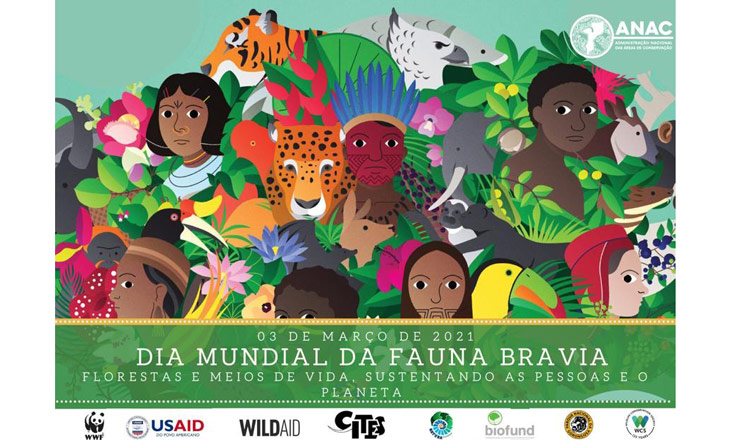
On 3 March 2021, World Wildlife Day is celebrated. The date was created by the United Nations in 2013, with the goal of celebrating world fauna and flora, and warning of the dangers of trafficking in species of wildlife
This year, the date is celebrated under the theme “Forests and livelihoods: Sustaining people and planet”, as a way of stressing the central role of forests, forest species, and the importance of the ecosystem services in maintaining the livelihoods of hundreds of millions of people throughout the world, and particularly indigenous communities and places with historic, social and economic ties with forest areas and areas adjacent to forests.
This is another call to reflection about how we can contribute to the preservation of forest resources. How we can understand the forest ecosystems and the closest wild life species and the threats they face, and know more about the local communities which live in or near the forests, the interdependence of their livelihoods with the forests, and how their knowledge and experiences can illuminate the efforts to conserve forest species throughout the world, which can indeed make a difference to the continuity of these species.
Mozambique is one of the countries fighting against poaching and against uncontrolled bush fires, phenomena which threaten the extinction of some wild life species, such as the rhinoceros and the pangolin. It is in this framework of threats to species of fauna and flora that the Foundation for the Conservation of Biodiversity (BIOFUND), is strengthening the message that the future of wild life and its habitats depends on human behaviour!
AFD and BIOFUND launch resilience project for the mangrove ecosystems in the Zambezi Delta and a Fund to mitigate the effects of climate disasters on Conservation Areas
To this end, on the morning of Wednesday 3 March, a financing agreement was signed between the French Development Agency (AFD) and the Foundation for the Conservation of Biodiversity (BIOFUND) for the project designated ECO-DRR.
This is a project with the aim of strengthening ecosystem, community and financial resilience, in the face of climate change in Mozambique. With the duration of five years, the project counts on financing of 6.29 million euros, of which 6 million euros is provided by AFD and 290,000 euros by the French Red Cross.
Due to its geography and topography, Mozambique is exposed to extreme climatic events, which lead to heavy human and economic losses. The country is in 10th position among the counties of the world most vulnerable to the risk of disasters. According to Mozambique’s National Disaster Management Institute (INGC), the country has already suffered more than 80 catastrophic events since the 1950s.
To confront the effects of these climatic disasters in the country, the ECO-DRR project will be divided into three components:
- The first component seeks to strengthen the capacity of local stakeholders in reducing the risk of disasters in the Zambezi Delta watershed at provincial, district, municipal and community level. This component will be implemented by the French Red Cross (CVF) and by the Mozambican Red Cross (CVM);
- The second component is centred on the protection, restoration and sustainable management of the mangrove ecosystems in the Zambezi Delta. It will be implemented by WWF through the creation of nature-based solutions, including the sustainable management of 15,000 ha of mangroves, the ecological restoration of 390 ha of mangroves and the establishment of 2 community conservation areas;
- The third component will create financial resilience of the system of Conservation Areas, in the event of climate change, through a contribution to the BIOFUND endowment. This includes the creation of a “Specific Fund to mitigate the effects of climate change”, and the development and implementation of its procedures over the long term, and at national level, to ensure that the Conservation Areas have access to funds to mitigate destruction and damage caused by natural disasters.
As a result of the project, it is expected that, after five years, an adequate density of mangroves has been established and maintained in the restoration areas (about 390 ha of mangroves), the livelihoods of the households who live in these ecosystems have been improved, and 15,000 ha de mangroves have been placed under sustainable management, through the development of mangrove management plans. The resilience of the system of Conservation Areas in the country will be strengthened with the creation of an emergency fund under the BIOFUND endowment, to be used in the event of natural disasters.
The project also envisages raising the awareness of about 70% of the members of the target communities about the measures to be implemented in the event of flooding, and the creation and validation of disaster response community action plans.
Committee set up to accompany the Biodiversity Conservation and Community Development Project in Chimanimani
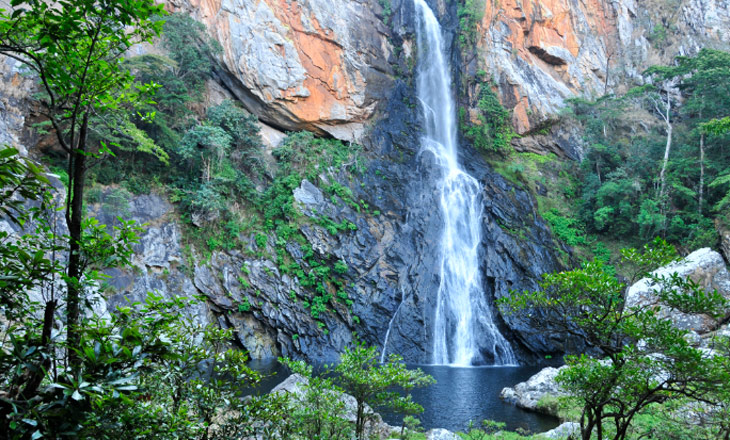
The Foundation for the Conservation of Biodiversity (BIOFUND), the National Administration of Conservation Areas (ANAC), the French Development Agency (AFD), Fauna and Flora International (FFI), the MICAIA Foundation, the Chimanimani National Park (PNC) and the National Sustainable Development Fund (FNDS), through the MozBio II Project, on 11 February 2021, held the first meeting of the Steering Committee of the Chimanimani Biodiversity Conservation and Community Development Project, abbreviated as the Chimanimani Project.
This project possesses total financing of 4.8 million Euros, of which 3 million come from the AFD, 1.2 million from the French World Environment Fund (FFEM) and 0.6 million from the FFI to be implemented over a period of 4 years.
This meeting approved the terms of reference of the Project Steering Committee, consisting of ANAC, BIOFUND, the Chimanimani National Park (PNC), the National Sustainable Development Fund (FNDS), the MICAIA Foundation, and Fauna and Flora International (FFI), and including the French Development Agency (AFD/FFEM) as an observer. ANAC chairs the committee, and BIOFUND provides its secretariat.
The partners discussed several aspects concerning the coordination, implementation and attainment of the results of the project. They approved the Plan of Activities and the Budget for 2021, for the four components of the project, namely:
- Component 1 referring to the knowledge, protection and valuing of natural and cultural heritage, to be implemented by ANAC and by the Chimanimani National Park;
- Component 2 referring to territorial organisation and local development, to be implemented by the MICAIA Foundation;
- Component 3 referring to the strengthening and development of value chains, also be implemented by the MICAIA Foundation; and
- Component 4, corresponding to mechanisms of financing the Chimanimani National Park and its buffer zone, to be implemented by BIOFUND.
The Chimanimani National Park and its buffer zone are located in Manica province. This is a region characterised by a diversity of endemic fauna and flora. This support for Chimanimani will strengthen other support channelled and/or financed by BIOFUND to this Conservation Area since 2017.
Our Biodiversity: Sampling of Exclusive Species in the Banhine National Park
With the onset of the rainy season in the Banhine National Park (PNB), a team of biologists consisting of two interns from the Programme of Leadership Conservation in Mozambique (PLCM), Golden Benedito Joaquim, with a licentiate degree in Biological Sciences, and Euderico Manjama, with a licentiate degree in Marine, Aquatic and Coastal Biology, are undertaking a sampling of aquatic species and birds predominant in that Conservation Area.
The sampling began in November 2020. In the initial phase, attentions were strongly directed to the sampling of plants and mammals. However, the rainy season, which began in December 2020, resulted in the creation of water hotspots which concentrate exclusive species that can be found in this period of the year, such as reptiles, amphibians, and even birds who spend their life cycle in water.
This activity is undertaken with the main purpose of identifying the predominant species of fauna and flora in the PNB. Based on this sampling. It will be possible to set up a data base with reliable information about the species, the times of year they can be seen, and the characteristics of their habitat.
Located in Gaza province, and covering an area of 7250 km2, the Banhine National Park is one of the beneficiaries of the Foundation for the Conservation of Biodiversity – BIOFUND, through Project Bee, which supports the payment of recurrent non-wage expenses, for their operations.
Emergency BIO-Fund: Evolution and its impacts on the protection of biodiversity in Mozambique
In just the 5 months since its creation, the Emergency BIO-Fund Programme has already contributed to the protection of 12,695,911 hectares of biodiversity in 24 of the country’s Conservation Areas, through support in paying the wages of over 958 Rangers. 11 of these are publicly managed areas, 11 are under private management and two are under community management.
Know the evolution of this programme and its impacts here!
WORLD WETLANDS DAY: Water, wetlands and life are inseparable
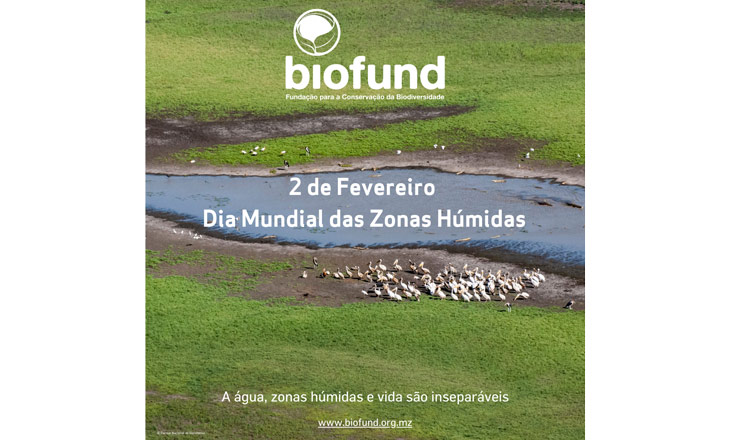
Decreed in 1971, in the Iranian city of Ramsar, 2 February marks the international celebration of the adoption of the Convention on Wetlands, or simply the Ramsar Convention. This is a convention that seeks to promote international cooperation and encourage actions for rational and sustainable management of the wetlands for the maintenance of the life of humanity and of biodiversity.
The Wetlands are ecosystems that are transitional between aquatic and terrestrial environments. They include swamp areas, natural or artificial waters, either permanent or temporary, with static or running fresh, brackish or salt water, including marine areas which, at low tide, are no more than six metres deep.
Wetlands are among the most productive areas in the world. They sustain humanity and nature, by providing a series of irreplaceable ecosystem services at global level, such as drinking water, bio-filtration of water, and a habitat for various migratory species. They maintain the balance between various ecosystems and contribute towards attenuating the effects of climate change.
Every year 200 new species of fish are discovered in wetlands, and more than a billion people depend directly on this ecosystem for their survival.
However, despite the importance of the wetlands, population growth, coastal urbanisation, pollution, and irresponsible consumption of water are placing them under irreversible pressure.
Today, each of us is called upon to contribute to the protection of the wetlands, by taking decisions with an environmental awareness, such as increasing efficiency in the use of water, not destroying wetlands, restoring damaged areas, and integrating this ecosystem into territorial planning and in the management of natural resources.
Mozambique signed the Ramsar Convention on Wetlands in 2004 (https://www.ramsar.org/wetland/mozambique). The Convention seeks to guarantee implementation of actions to protect and conserve these aquatic ecosystems, out of recognition of the role they play in ecological balance. Mozambique currently has two Ramsar proclaimed areas, which cover a total area of 4,534,872 hectares, namely the Marromeu Complex (which includes the Delta of the Zambezi River, where BIOFUND is supporting the conservation of biodiversity) and Lake Niassa and its coastal area.
Diocórcia Chaguala – Mother, wife and heroine of biodiversity
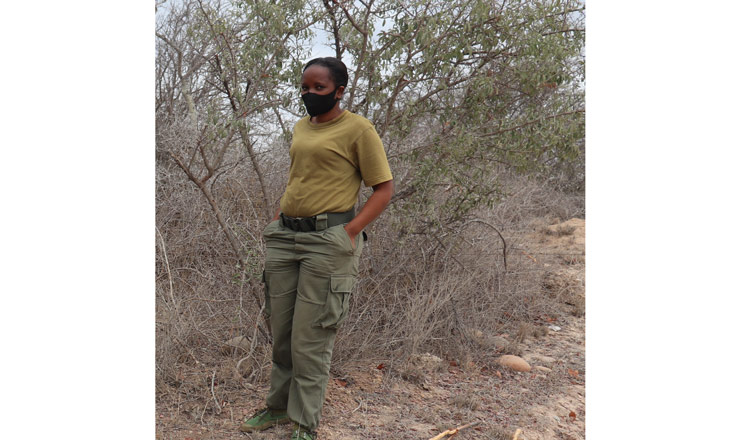
Diocórcia is one of the few women in the Limpopo National Park (PNL) who works in the inspection sector. She has been working there for 12 years. She always dreamed of working in the conservation area, and this dream came true in 2008, when she entered the PNL, as a ranger.
A wife, a mother and a housewife, Diocórcia first went through a training course on inspection which demanded a great deal of courage and persistence from her. She confesses that, at first, it was not easy to reconcile her activities, particularly because she is a woman, since the work of inspection requires courage and determination.
“My greatest challenge was when I had to abandon my family for several days in order to stay at the inspection posts with my other colleagues. That was not easy. There was a moment when I considered giving up due to the adversities, but my courage and the support of my family saw me through to the end”.
Currently, the number of women working in the inspection sector in Mozambique has been growing. According to the data from the National Administration of Conservation Areas (ANAC), the Conservation Areas throughout the country have more than 170 women who do not spare efforts to preserve from nature.
Família de leões dá boas-vindas às estagiárias do PLCM na Reserva Especial Niassa
This happened last Wednesday, January 20, at the offices of Mariri, a concessionaire for Block L5S of the Special Reserve of Niassa, just after the arrival of Sofia Nhalungo and Tânia Zeferino, interns of the National Administration of Conservation Areas (ANAC) and beneficiaries of the Mozambique Program for Conservation Leadership (PLCM).
And if the relationship between this feline and humans is often frightening, this time the meeting was friendly. The lion family, made up of a male and two females, not only decided to take a photo break, but also remained calm when they realized the human presence. After a few minutes, the family decided to continue their tour of the reserve.
Seeing the lion family was a remarkable experience for our future conservation leaders. After all it is not every day that we have the chance to come face to face with the “king of the jungle”.
“It was exciting to see the lions peacefully in their habitat, seeming not to mind our presence. At that moment, I could see that it was actually us humans who made them our enemies, because we invaded their space and they show aggressive behavior to defend themselves. ” Sofia Nhalungo said
In turn, Tânia Zeferino said that when she saw the lions so close and without showing any aggressive behavior, she realized that coexistence between humans and wildlife is possible, if the space of each one is respected.
The felines’ peaceful and harmonious visit to the interns highlighted the possibility of good coexistence between human beings and nature and the mutual gains that conservation offers to man as well as nature. Likewise, the potential that Conservation Areas have for the practice of nature-based tourism was highlighted.
Sofia Nhalungo and Tânia Zeferino are recent graduates in Ecology and Conservation of Terrestrial Biodiversity and in Marine, Aquatic and Coastal Biology, respectively and are in the Niassa Special Reserve to develop practical fieldwork skills for a period of seventeen days, within the scope of the PLCM Internship Program.
Conclusion of the First project financed by the BCI Bio card

This is a project supported by the Foundation for the Conservation of Biodiversity (BIOFUND), through the Bio card, a partnership between BIOFUND and the Commercial and Investment Bank (BCI), which seeks to contribute to the preservation of the rhinoceros, an endangered species, in the Sabie Game Park, in Moamba district.
The Sábiè Game Park comprises 25% of the total border of the Kruger National Park (KNP) with Mozambique and is of utmost importance for rhino and elephant conservation efforts, as it acts as a buffer zone, standing between one of the largest remaining concentrations of rhinos worldwide in the KNP to the west and the principal poaching threat emanating from eastern Mozambique.
The project, designed by the MozParks Initiative INC, consisted of the acquisition, installation, and implementation of a safe and efficient monitoring and tracking system to better protect the rhino (black and white), which are concentrated in the south of the Kruger National Park (KNP) in South Africa, and cross the border regularly to the Sábiè Game Park in Mozambique. This activity has as its main objectives to monitor and track the rhino, to improve its protection and contribute to the study of the behavior and its ecological preferences in this Conservation Area.
The project had two phases of implementation, the first being the acquisition of tracking material and the second of placing tracking tags on rhinos.
The placement of tracking tags on rhinos was done with aerial support, by the helicopter and intervention of a specialized veterinary unit (Mozambique Wildlife Services) to anesthetize rhinos, using the following procedure:
- The rhinoceros is detected within the perimeter of the Sábiè Game Park and the team meets to perform the operation;
- The operation takes place within 24 hours after the rhino’s detection and consists of locating the animal, anesthetizing, placing the tracking tag, treating any wounds that it may have and then proceeding to its release;
- Each tag is permanently monitored by the tracking system.
At the same time, as an additional measure to guarantee greater protection, the Sábiè Game Park in collaboration with Saving the Survivors, also adopted the technique of removing rhino horns. This process is carried out while the rhino is sedated, where after cutting, the horns are weighed, labeled, and kept safely stored outside of the Conservation Areas.
This procedure inhibits the slaughter of rhinos by poachers and has shown positive results in reducing the deaths of rhinos in reserves and parks in Zimbabwe and in South Africa, because, unlike elephant tusks, rhino horns grow back after a few years and safe and regular removal can ensure that they are no longer the target of poachers. Learn more about the removal of rhinoceros horns here!
It should be noted that in August 2020, two rhinos who had not been so protected were slaughtered and had their horns brutally removed by poachers in the Sábiè locality.
The rhino monitoring and tracking system financed by BIOFUND through the Bio card, as well as the technique of removing horns in animals, an initiative of the Sábiè Game Park and Saving the Survivors, is expected to contribute to the reduction of rhinos in the country.
Muthemba Safaris Community in Gaza province, committed to the conservation of biodiversity
Through the opening of new schools, water boreholes for the communities, and the promotion of environmental education activities in the local schools, among other community development activities, Muthemba Safaris is making communities aware of the need to embrace the cause of the preservation of natural resources. This was the way of keeping the community in the buffer zone committed to the conservation of about 10,000 hectares of Mopane forests, and a fauna consisting mostly of buffaloes, elephants, impalas, leopards, hyenas, lions and various species of birds. After all, conservation is development.
“The relationship of Muthemba Safaris with the local community is very good. Social responsibility actions have contributed to the involvement of the community in conservation activities”, according to Zefanias Williamo Sibanda, who is a member of the Tchenge community and a ranger of Muthemba Safaris.
This observation was made, during a monitoring visit to Muthemba Safaris, a Game Farm located in the Chicualacuala administrative post, in Massangena district, Gaza province, in the framework of the Emergency BIO-Fund. This programme has benefitted the payment of the rangers’ wages since August 2020. The wages were previously covered by funds from tourist income which is currently non-existent because of the Covid-19 pandemic.
Gaby: the dog that makes a difference in inspection in Massingir Safaris
Slightly more than two years old, the dog Gaby has been a true guardian of nature and an indispensable piece in the monitoring activities of Massingir Safaris.
With his sniffing skills, this small mammal has helped the three rangers of Massingir Safaris to conserve the biodiversity of an area of 8,000 hectares. For not only is Gaby intelligent, but in cases of chasing poachers, Gaby manages in short order to track the steps left by the poachers.
The use of sniffer dogs has been successful in the patrolling activities in Massingir Safaris. Currently this conservation area has kennels for six dogs trained for inspection and patrolling.
Located in Gaza province, Massingir Safaris is a conservation area under private management which, despite the reduction in income because of Covid-19, continues to conserve biodiversity, and will shortly benefit from the Emergency BIO-Fund. Its biodiversity consists of a flora and fauna rich in buffaloes; impalas; baboons; various species of birds and insects; the Mopane forest; the Terminalia forest; and many species of Combretum and Acacia nigrescens.
In term of leisure, Massingir Safaris offers its guests a variety of activities, such as hunting, and various viewpoints from which to observe breath-taking nature.
Conservation sector unites efforts to combat poaching through an awareness raising campaign
Under the name “Poaching Steals from All of Us”, the campaign has been undertaken by the National Administration of Conservation Areas (ANAC), in collaboration with WILDAID, a non-governmental organisation that works for the preservation of wild life, and other conservation partners, including the Foundation for the Conservation of Biodiversity – BIOFUND.
The goal of the campaign is to raise the awareness of society about the need to preserve the diversity of fauna and flora. This campaign will be undertaken through television documentaries, small public service announcements, billboards, social media, and other awareness activities in remote areas, using local ambassadors such as politicians, musicians, sports people, religious leaders and rangers.
In an initial phase, the former President of the Republic, Joaquim Alberto Chissano, and the artists Stewart Sukuma, Lizha James and King Sweet Nassam took part as campaign ambassadors, using their voices and images as a resource to raise awareness for the fight against poaching.
Watch the campaign videos through the links below, and don’t forget to subscribe to our Youtube.
King Sweet: https://youtu.be/F-8lhemkUP0;
Stewart Sukuma: https://youtu.be/8fNRdy3ogWo;
Lisa James: https://youtu.be/SdixV_u_lgg;
Joaquim Alberto Chissano: https://youtu.be/iOIVkahiwy4
Zinave National Park restructures buffer zone community association
Another two youths begin their career in the conservation of biodiversity through the PLCM
The interns, Atairis Massonganha, trained in Economics, and Talven Samuel Jackson, trained in Public Administration and Management, in November began their activities of a pre-professional internship in the World Wide Fund For Nature – WWF.
The internship lasts for 6 months and is taking place in the central offices of WWF. During this period, the youths will have the opportunity to apply the knowledge they acquired during training for the benefit of biodiversity.
Atairis Massonganha, hopes to end the internship with a different vision of the conservation of biodiversity and to acquire a professional attitude.
“I hope to come out of the internship endowed with relevant knowledge applicable in the conservation sector and in society in general. I shall also give my best in using my knowledge for the protection of nature”.
The integration of the interns into WWF is the result of the partnership between that organisation and the Foundation for the Conservation of Biodiversity – BIOFUND in the context of implementing the internships of the Mozambique Programme for Leadership in Conservation – PLCM.
The PLCM seeks to motivate for the conservation of biodiversity not only traditional conservation professionals, but also professionals from other areas of knowledge, which are all relevant and necessary for conservation. In this context, over the next six months it is intended to integrate about 20 interns in various partner institutions nationally.
#FormandoFuturosLíderesdeConservaçãoemMoçambique
Hagnésio Chiponde: From football player to leader in the conservation of biodiversity
Hagnésio Chiponde is a young Mozambican trained in veterinary medicine at the Eduardo Mondlane University, and a beneficiary of the first edition of the internship programme of the PLCM, which took place in the National Administration of Conservation Areas (ANAC) and in the Maputo Special Reserve and the Ponta do Ouro Partial Marine Reserve from March to August 2020.
Hagnésio was always passionate about football and dreamed of playing professionally. However, his dedication and commitment to the protection of biodiversity spoke louder and today he works in the conservation sector.
He is an example of the positive impact that the PLCM has on the professional career of young people, since, after six months as an intern, he was hired by an organisation which works for the conservation of species and to mitigate the conflicts between people and wild life.
“I had the opportunity to begin my career in the Conservation Area with the PLCM and currently I am part of the team of veterinarians helping the National Administration of Conservation Areas in field operations for the conservation of wild life. It has been a captivating experience”.
For Hagnésio, the pre-professional internship has increased his will to work for the conservation of biodiversity and has rapidly opened up for him very interesting professional opportunities!
BIOFUND signs 1st subvention agreement under the "PROMOTE Biodiversity" programme, to support the Gilé National Park.
With financing from the European Union, the Foundation for the Conservation of Biodiversity – BIOFUND, signed, in November 2020, the first subvention agreement under the “PROMOTE Biodiversity” programme, with the François Sommer Foundation/International Foundation for Wildlife Management – FFS-IGF – to the approximate value of 2.3 million Euros for direct support to the Gilé National Park, until, 2025.
Through the signing of this agreement, it is intended to add value to the long experience of technical and financial assistance carried out by FFS-IGF, in support of the management and administration of the Gilé National Park, with a focus on strengthening the capacity to inspect biodiversity, based on the Technical Agreement on the Management and Development of the Gilé National Park, signed in 2007 between the National Administration of Conservation areas ANAC and the FFS-IGF.
This project fits into the subvention contract between BIOFUND and the European Union, in the context of implementing the “PROMOTE Biodiversity” project, which intends to disburse 10.2 million Euros under the management of BIOFUND. The project seeks to cover 3 geographical areas in Zambezia and Nampula provinces – namely, Mount Mabu, the Gilé National Park, and the Protected Area of the First and Second Islands.
Webinar: Study on metrics to assess the ecological condition of mangrove forests: a contribution for the implementation of biodiversity offsets in Mozambique
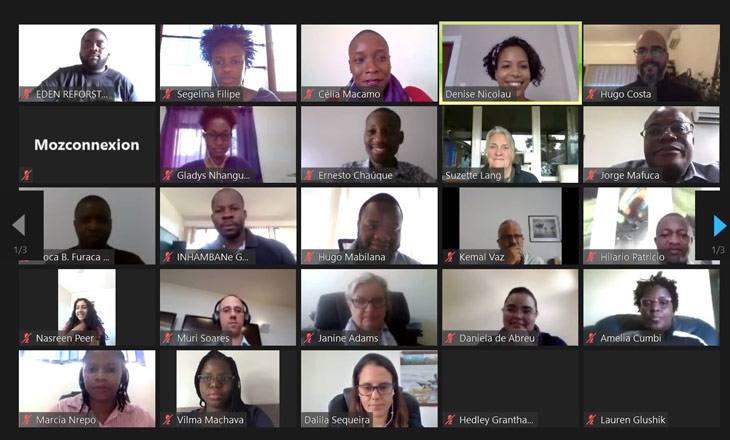
The Foundation for the Conservation of Biodiversity – BIOFUND in partnership with the Eduardo Mondlane University – UEM and Wildlife Conservation Society – WCS, held on November 12, 2020 from 9 – 11 am a Webinar for the presentation of the “Progress report on the study on metrics to assess the ecological condition of mangrove forests in Mozambique ”.
This study started in 2019 and is part of the efforts of the Biodiversity Offsets Program implemented by BIOFUND, WCS and the National Environment Directorate (DINAB) for the development of technical tools to assess the ecological condition of habitats and species and support the implementation of the mitigation hierarchy in Mozambique.
This Webinar is the second meeting held with the main stakeholders involved in mangrove management in Mozambique to discuss the development of metrics for assessing the ecological condition of mangrove forests. The event counted with 60 national and international participants including representatives from the government, the private sector, NGOs, academia, and multilateral and bilateral agencies.
The progress report was presented by the study leader, Dr. Célia Macamo, lecturer and researcher at the Eduardo Mondlane University, who during the presentation highlighted the importance of harmonizing the procedures to assess the ecological condition of mangrove forests in Mozambique in order to provide valuable tools to assess progress in conservation projects and support the effective implementation of the mitigation hierarchy in Mozambique.
To access the Webinar presentations click here
To access the Webinar recording click here
For more information about the program visit https://www.biofund.org.mz/projects/programa-de-contrabalancos-de-biodiversidade/
BIOFUND and its partners meet to discuss the proposed regulations for Biodiversity Offsets
On 2 and 3 November 2020, the National Directorate of the Environment (DINAB), and its partners, the Wildlife Conservation Society (WCS) and BIOFUND, held a retreat on the Macaneta beach in Maputo to review the proposed Regulations on biodiversity offsets.
The main objective of the meeting was to analyse the fourth version of the draft Regulations on Biodiversity Offsets, and to draw up the final version of this document, which will later be submitted for approval by DINAB at the Technical Council of the Ministry of Land and environment (MTA).
The meeting also decided on the next steps to be taken and the calendar for approval of the Regulations on Biodiversity Offsets by the Council of Ministers.
The draft Regulations on Biodiversity Offsets arise in the context of establishing clear and feasible principles, methodologies, requirements and procedures that allow the correct implementation of biodiversity offsets, integrated into environmental assessment, in order to face the rapid economic development in the mining sector, which threatens the irreversible transformation of biodiversity and its ecosystem services.
Some 21 people took part in the two day meeting. They came from various Government institutions, including the sectors of the environment, the conservation areas, mining, fisheries, and partners of BIOFUND and WCS through the COMBO Project.
BIOFUND Realiza Primeiras Sessões de Monitoria Virtual das Áreas de Conservação
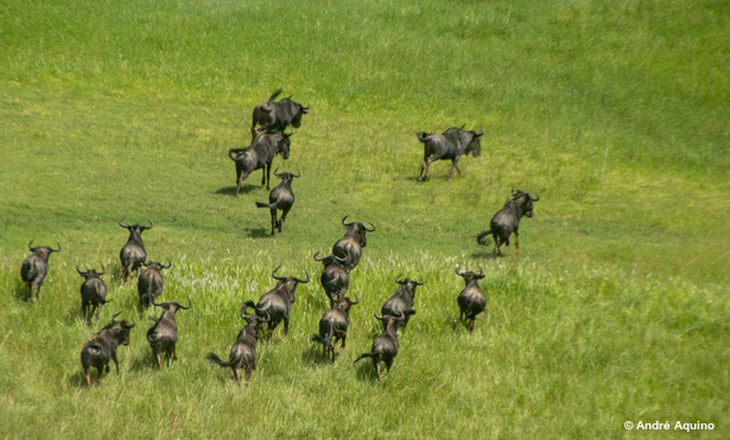
A Fundação para Conservação da Biodiversidade – BIOFUND, realizou de 9 a 15 de Outubro de 2020, sessões de monitoria virtual, com as Áreas de Conservação beneficiárias para conhecer o nível de execução do plano de actividades face à nova realidade imposta pela COVID-19 e proporcionar um espaço de partilha de experiências entre os beneficiários.
As sessões contaram com a participação da equipa da BIOFUND, ANAC, representantes da União Europeia, Peace Parks Foundation, Agência Francesa de Desenvolvimento, nossas parceiras, Administradores e Técnicos das Áreas de Conservação, na ocasião, a BIOFUND deu a conhecer sobre os seus novos programas assim como as oportunidades de financiamento.
Trata-se das Áreas de Conservação beneficiárias dos projectos: Abelha (AFD+BIOFUND); MozBio2 (Banco Mundial/IDA); ASA (BIOFUND) e Conservation International (BIOFUND). Desde 2016 até à data já foram canalizados mais de 6 Milhões de Dólares para as Áreas de Conservação.
Como resultado deste apoio, as Áreas de Conservação abriram novos postos de fiscalização e têm vindo a registar um aumento significativo no número de patrulhas realizadas, o que resulta em maior área fiscalizada, mais armadilhas desactivadas e mais avistamento de espécies de fauna.
No total, são actualmente 14 as Áreas de Conservação financiadas pela BIOFUND, nomeadamente: Parques Nacionais de Banhine, Quirimbas, Mágoè, Gilé, Chimanimani, Zinave, Limpopo, Arquipélago de Bazaruto, a Reserva Especial de Maputo, Reserva Marinha Parcial da Ponta de Ouro, as Reservas Nacionais de Pomene e Marromeu, a Zona de Protecção Total do Cabo de São Sebastião e a Área de Protecção Ambiental das Ilhas Primeiras e Segundas.
Mágoè National Park steps up protection of Biodiversity
This fact was determined during the monitoring visit to the Magoe National Park (PNM) held recently by the BIOFUND team, in the context of approving the Park’s entry into the BIO-Emergency Fund. In this way, it will benefit from the payment of wages to its 68 existing rangers.
The PNM covers an area of 355,852,044 hectares. It consists of a semi-closed forest, where species of dry vegetation are dominant, notably Colophospermum mopane (mopane) and Adansonia digitata (baobab). It contains a variety of species of wild life, including buffaloes, elephants and crocodiles. The PNM has also been receiving support from BIOFUND since September 2019, for paying operational costs which guarantee that inspection activities are undertaken.
The Administrator of the Magoe National Park, Luís dos Santos Namanha, said that the BIOFUND financing will inaugurate a new era for the park’s activities. He added “the Mágoè National Park was created in 2013 and was operating without any financial partners. With the financing from BIOFUND, it was possible to expand the number of inspection posts from 5 to 9, which helped increase the wild life population, in terms both of species and of numbers. The new support from the BIO-Emergency Fund will revive the protection of the international migratory corridors for wild life between Mozambique, Zimbabwe and Zambia and vice-versa”.
This is one example of the more than 12 Conservation Areas, which are maintaining their inspection activities during the Covid-19 pandemic, thanks to the BIO-Emergency Fund.
PLCM Interns Integrated into Community Development Activities in Zinave National Park
The interns Maria Madalena Rangel, with a degree in Anthropology, and Dulce da Flora Simão, with a degree in Biological Sciences, had an initial induction into activities of the community sector and the priority actions to be undertaken, notably the community food security programme. This seeks to guarantee food for the households recently resettled from the interior of the park to the buffer zone and other localities in Mabote district.
During the first weeks of activities, the team accompanied the conservation agriculture project in the Maculuve community, where cassava cuttings were planted and irrigated.
One of the interns made her satisfaction clear, when she said how gratifying it is to be part of a programme which, on the one hand, undertakes activities to protect biodiversity, and, on the other, contributes to the development of the communities.
”Apart from irrigation, we made the households covered by the project aware of how to organise themselves so as to care regularly for the agricultural field, making sustainable use of the material provided by the Park”, said Maria Rangel, PLCM intern in the Zinave National Park.
The Zinave National Park is located in Mabote district, in Inhambane province, and covers an area of 400,000km². This Conservation Area has benefitted from BIOFUND support since 2018, through financing from Project Bee, for the protection of local biodiversity.
BIOFUND ensures that 11.9 million hectares of biodiversity are protected until June 2021 in the country’s Conservation Areas
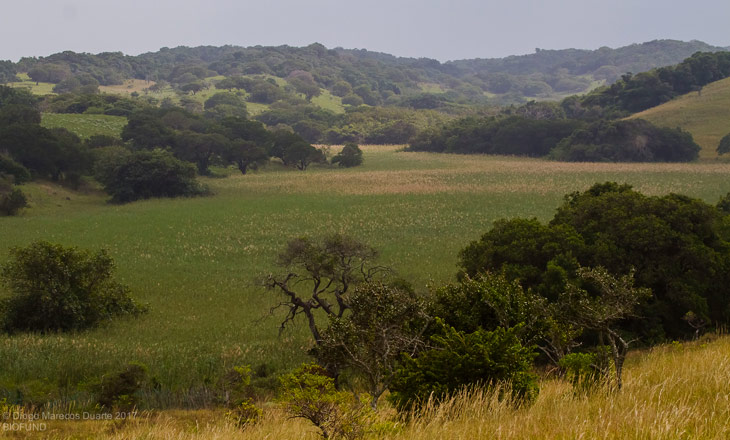
The Foundation for the Conservation of Biodiversity – BIOFUND, at the Second Extraordinary Meeting of its Board of Directors, held in September 2020, approved the extension for a further nine months of PHASE 1 of the BIO-Emergency Fund, thus guaranteeing additional subventions to support the Conservation Areas under public and private management, up until June 2021.
The BIO-Emergency Fund was set up in June of this year for an initial period of three months, with the aim of guaranteeing that the drastic decline of tourism in the country would not damage the protection of natural resources in the Conservation areas, particularly in those areas where tourist income finances their running costs. In the initial period, from July-September 2020, the programme benefitted 10 conservation areas. 287 rangers and other professionals of the sector remained in their jobs, 909 patrols were held per month, equivalent to 28,052 hours of work, and 1,897,300 hectares of biodiversity were protected.
The extension of this support envisages the payment of 100% of the wage costs of the Conservation Areas under private management in comparison to the current 50%. It will also support other running costs,as well as supporting communities living next to the Conservation Areas under public and private management. It also envisages support for new private sector operators.
As for the Conservation Areas managed by the public sector, BIOFUND will guarantee, up until June 2021, the wage costs of the Conservation Areas worst hit by the loss of tourist income, as well as support in means of transport, and materials to prevent Covid-19.
This support has only been possible thanks to the growth of the BIO-Emergency Fund which currently (3 months after it was established) contains US$ 4.3 million. Of this sum, US$ 3 million comes from BIOFUND, US$ 1 million from the Government of Sweden through the World Bank/MozBio2 and US$ 249.000 from USAID/SPEED+.
Sailors Trained in the Conservation of Marine Ecosystems in the Bazaruto Archipelago National Park
In August, the Bazaruto Archipelago National Park (PNAB) started training for sailors in codes of conduct for marine wildlife, with the main objective of involving local partners in the active conservation of marine ecosystems in the PNAB.
With the end scheduled for September, the training consisted of sharing general information about the PNAB and Codes of Conduct that guide sailors, as a way to protect various marine species, such as dugongs, turtles, whalesand coral reefs, among others.
“This capacity building has allowed alignment in the communication between the communities and the park. We believe that, with the information provided here, the community will be more motivated and responsible for the protection and conservation of the park’s natural resources”said António Cuhanha, a sailor and a member of the local community.
This activity is part of the improvement in the relations between the PNABand the local communities, as a way of expanding knowledge of the Conservation Areas and the importance of protecting the ecosystems.
The PNAB consists of the islands of Bangué, Magaruque, Benguérra, Bazarutoand Santa Carolina. It covers an area of 1,430 km² and benefits from financial support from the Foundation for the Conservation of Biodiversity (BIOFUND) for the payment of operational costswithin the scope of the Abelha project, since 2018. For more information about the training access here.
BIOFUND conducts the first monitoring visit to the Sabie Game Park (SGP) under the Emergency BIO-Fund
The Foundation for the Conservation of Biodiversity, BIOFUND, within the scope of the BIO-Fund Emergency Program, carried out on September 9, 2020 the first monitoring visit to the Sabié Game Park (SGP), taking all the necessary COVID-19 security measures.
The main objective of the visit was to train the SGP team on BIOFUND’s monitoring procedures as well as to collect information on patrolling, inspection, conservation and community involvement activities. The visit also served to integrate new members of the program team.
The SGP is located in the province of Maputo, in the district of Moamba, has an area of 30,000 ha and is characterized by a rich terrestrial biodiversity with emphasis on buffalo, giraffe, rhino and elephant.
As one of the eight privately managed Conservation Areas benefiting from the fund, the park has the support of BIOFUND to pay 50% of the wage costs of the 15 rangers, as a way to reduce the impact of the loss of tourism revenues during the COVID-19 pandemic and maintain an active ranger force in the field.
International Day for the Preservation of the Ozone Layer
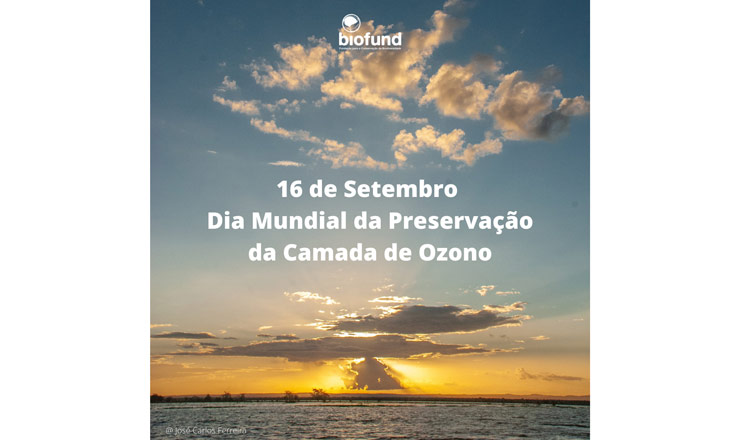
Today, 16 September, marks the International Day for the Preservation of the Ozone Layer.
With the aim of preserving the ozone layer, which works as a natural shield for the planet against the ultraviolet radiation emitted by the sun, the Montreal Protocol was established on 16 September 1987. This is an international agreement which has been signed by 191 countries.With the signing of the agreement, 16 September became the International Day for the Preservation of the Ozone Layer.
The ozone layer is a thin envelope formed by the gas ozone (O3) which surrounds the earth and protects living organisms from the radiation emitted by the sun. Without this layer, located 25 to 30 kms above the surface (stratosphere), the existence of life on our planet would not be possible.
The reduced thickness of the ozone layer is a serious problem for human beings. In the regions where this reduction is noted, there is a greater incidence of allergies and eye problems, such as cataracts and blindness, and skin problems such as cancer. Furthermore, the radiation also affects plants and other living beings. Small actions such as the recycling of materials, reduction in the use of plastics, and planting trees could help protect the ozone layer.
Do your part, and contribute to the preservation of our planet!
1st RedLAC- CAFÉ Virtual Congress
This is an inedited event, which will bring together a worldwide community of conservation finance professionals, including environmental funds, donors, impact investors, NGOs, the private sector and government authorities between the 6th and 8th of October.
The Foundation for the Conservation of Biodiversity (BIOFUND) is a founding member of CAFÉ (established in 2011) and will participate in this congress.
Ensure your participation in the event by registering through the link https://live.eventtia.com/en/redlac-cafe
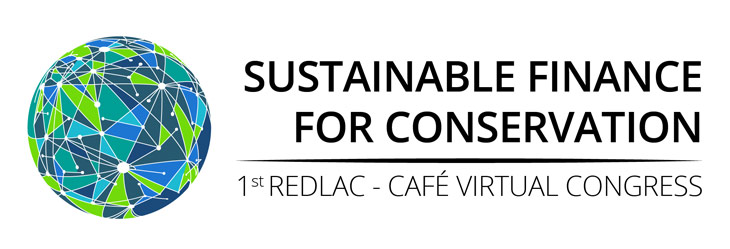
The Foundation for the Conservation of Biodiversity strengthens and expands its operational support for the Conservation Areas during COVID-19
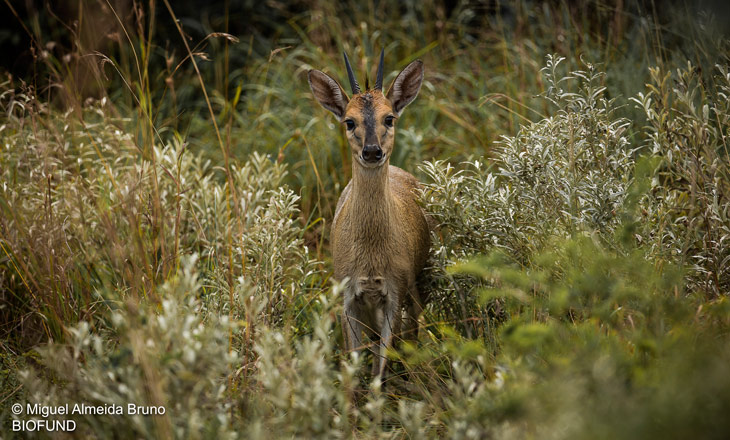
The Foundation for the Conservation of Biodiversity, BIOFUND, has adopted several measures that allow it to operate fully, by implementing forms of distance working, and a rotating shift regime for its staff, in addition to holding virtual meetings.
BIOFUND is continuing to guarantee support for the operational costs of 15 Conservation Areas in 9 of the country’s provinces, and the budgets of the beneficiaries are being adjusted so as to ensure the measures of health protection necessary in each Conservation Area.
In August, some of the professional internships in Maputo city were extended for a further six months, under the Conservation Leadership in Mozambique Programme (PLCM). Also under this programme, we should mention the beginning, in September, of the professional internships in the Conservation Areas, previously suspended because of the pandemic situation.
A special stress should be laid on the creation of the BIO-Emergency Fund, launched on 15 June, with the duration of six months, as a way of minimising the impact of the Covid-19 pandemic on the Conservation Areas of Mozambique. This fund consists in supporting the payment of the wages of rangers who depend on income from tourism. So far it has covered more than 190 rangers in 10 privately managed Conservation Areas.
The organisation believes that, with these measures, the impacts of Covid-19 will be minimised and the various biodiversity stakeholders in the Conservation Areas can continue to play their role in protecting Mother Nature.
BIOFUND and partners exchange ideas about the Biodiversity Exhibition
After 5 years of editions of the Biodiversity Exhibition, the Foundation for the Conservation of Biodiversity (BIOFUND) brought together partners, donors and volunteers in a debate about the previous editions, and the prospects for new approaches to the Biodiversity Exhibition
The meeting was held virtually, through the Zoom platform, and about 40 people took part.
For two hours, in addition to the lessons learnt, the participants exchanged ideas about the future of the exhibition, with a stress on restructuring it, so that it becomes a national and more interactive event. A further aspect raised in the meeting concerned the use of new publicity tools, as a way of making the exhibition more comprehensive.
To watch the recording of the meeting, click here
Do you have any innovative ideas about the Biodiversity Exhibition and would like to share them with BIOFUND? Send an email to info@biofund.org.mz

